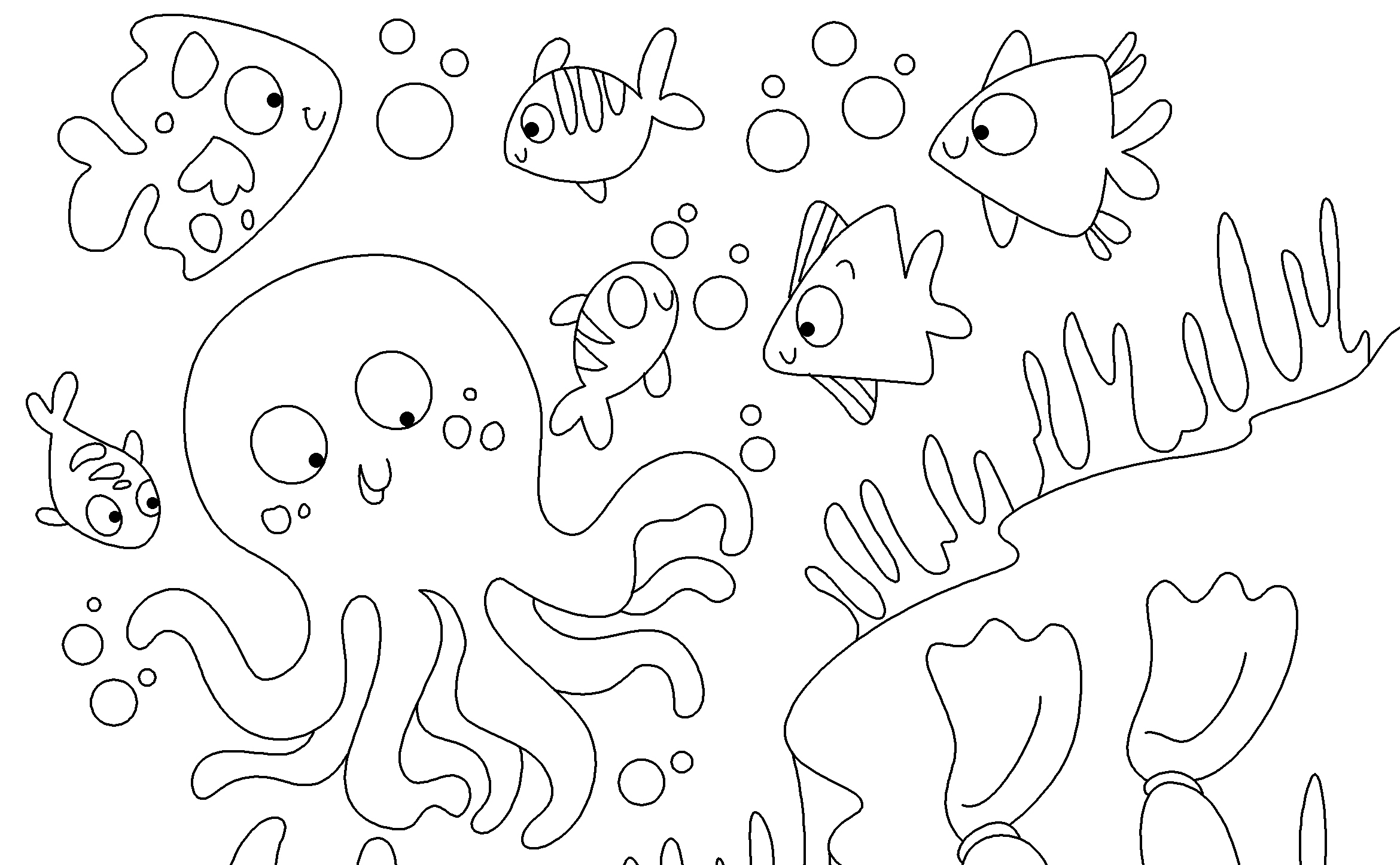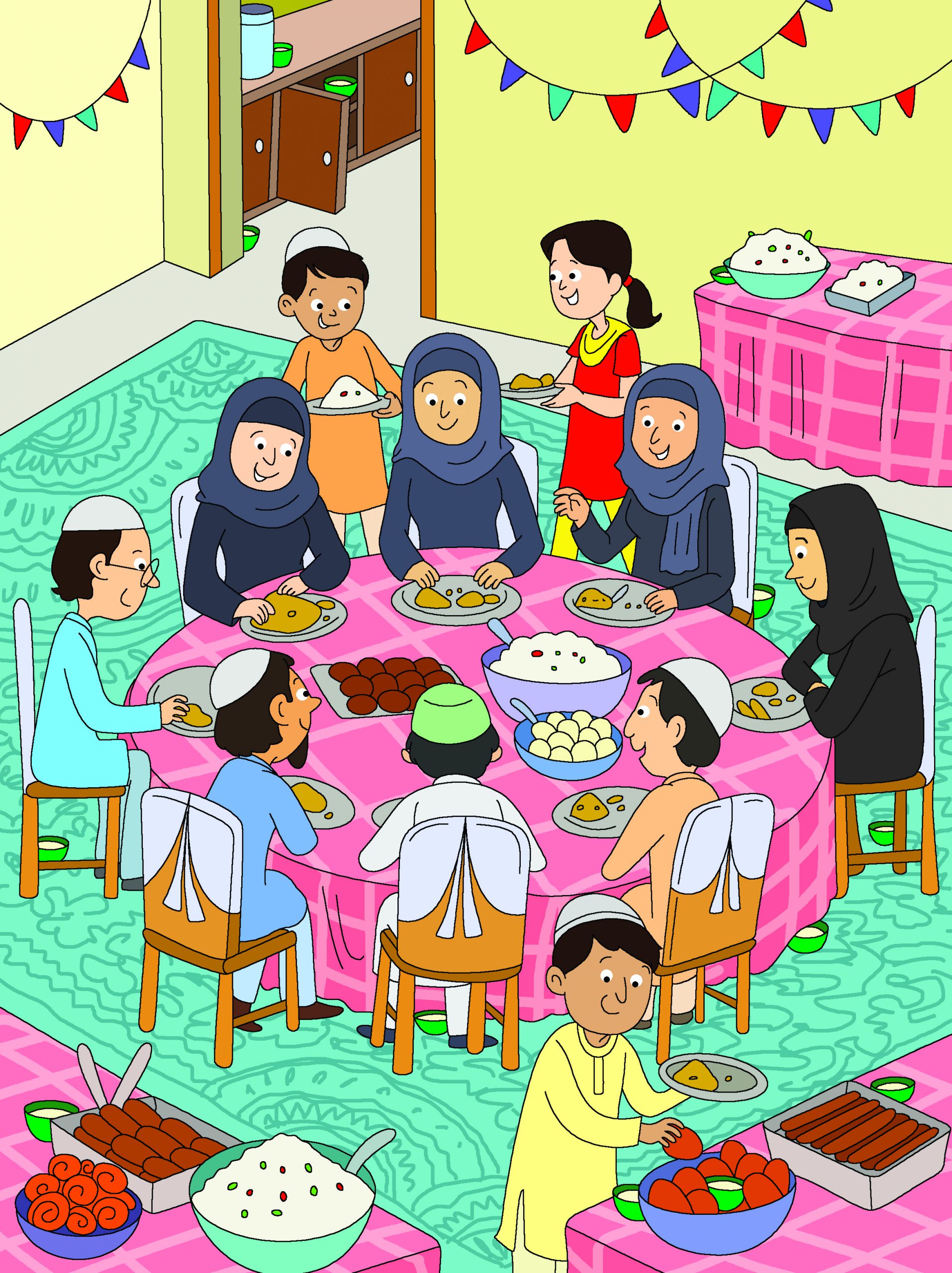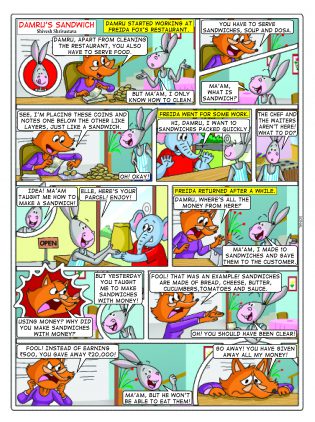
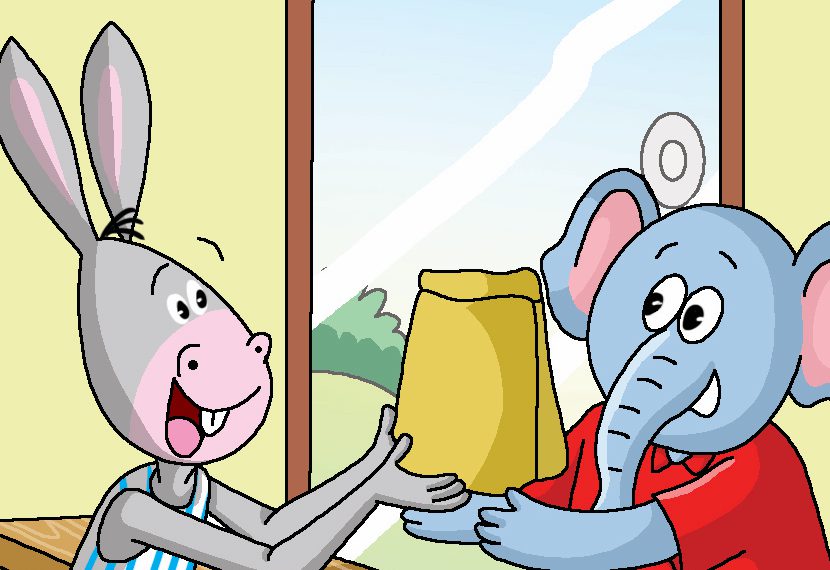



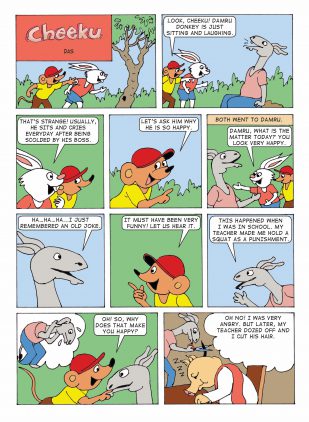
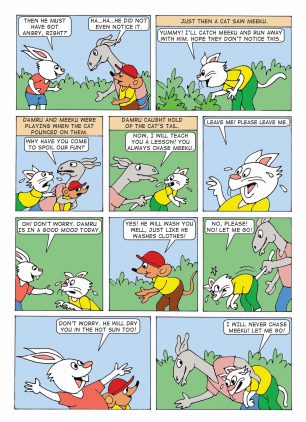
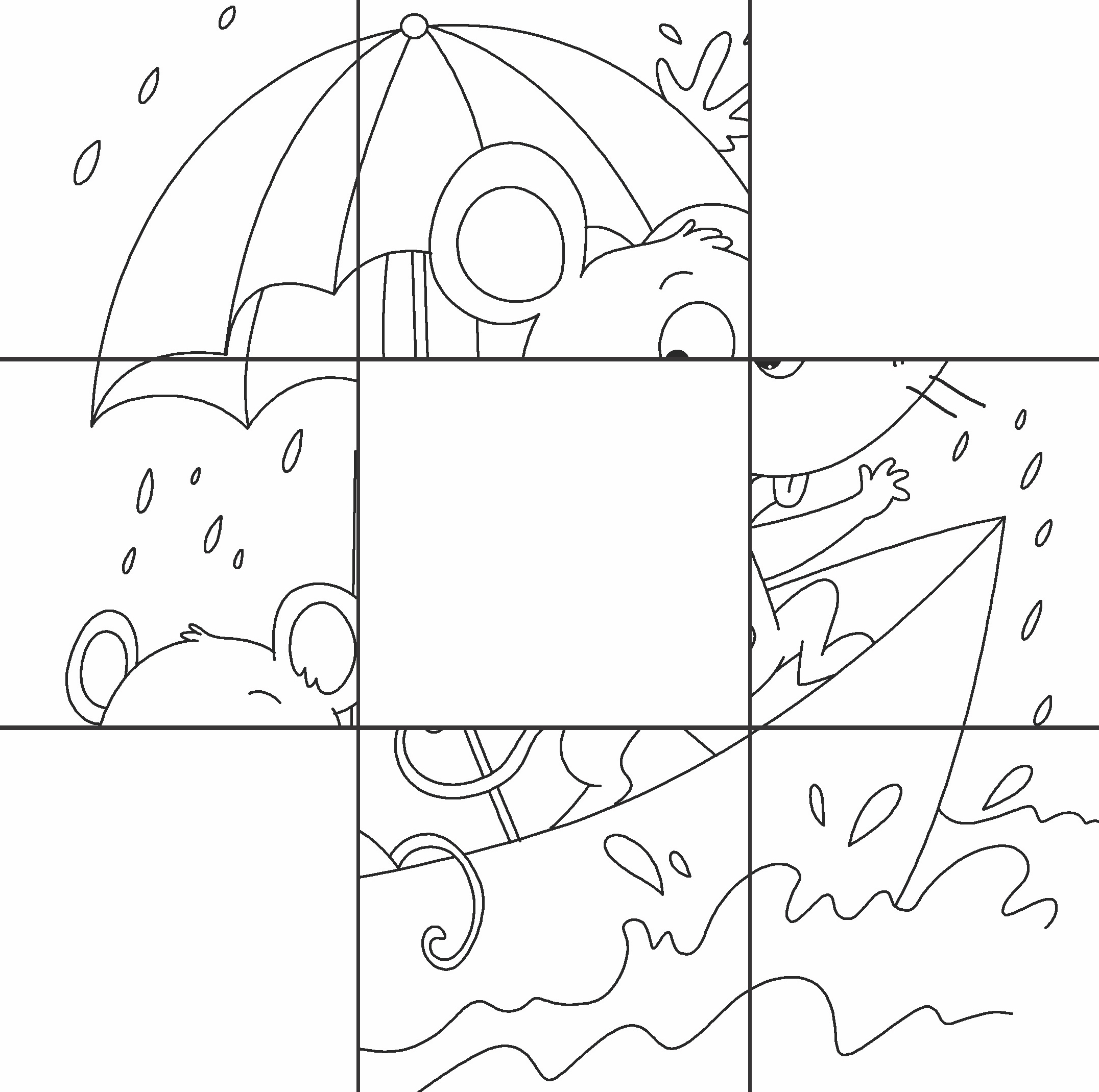
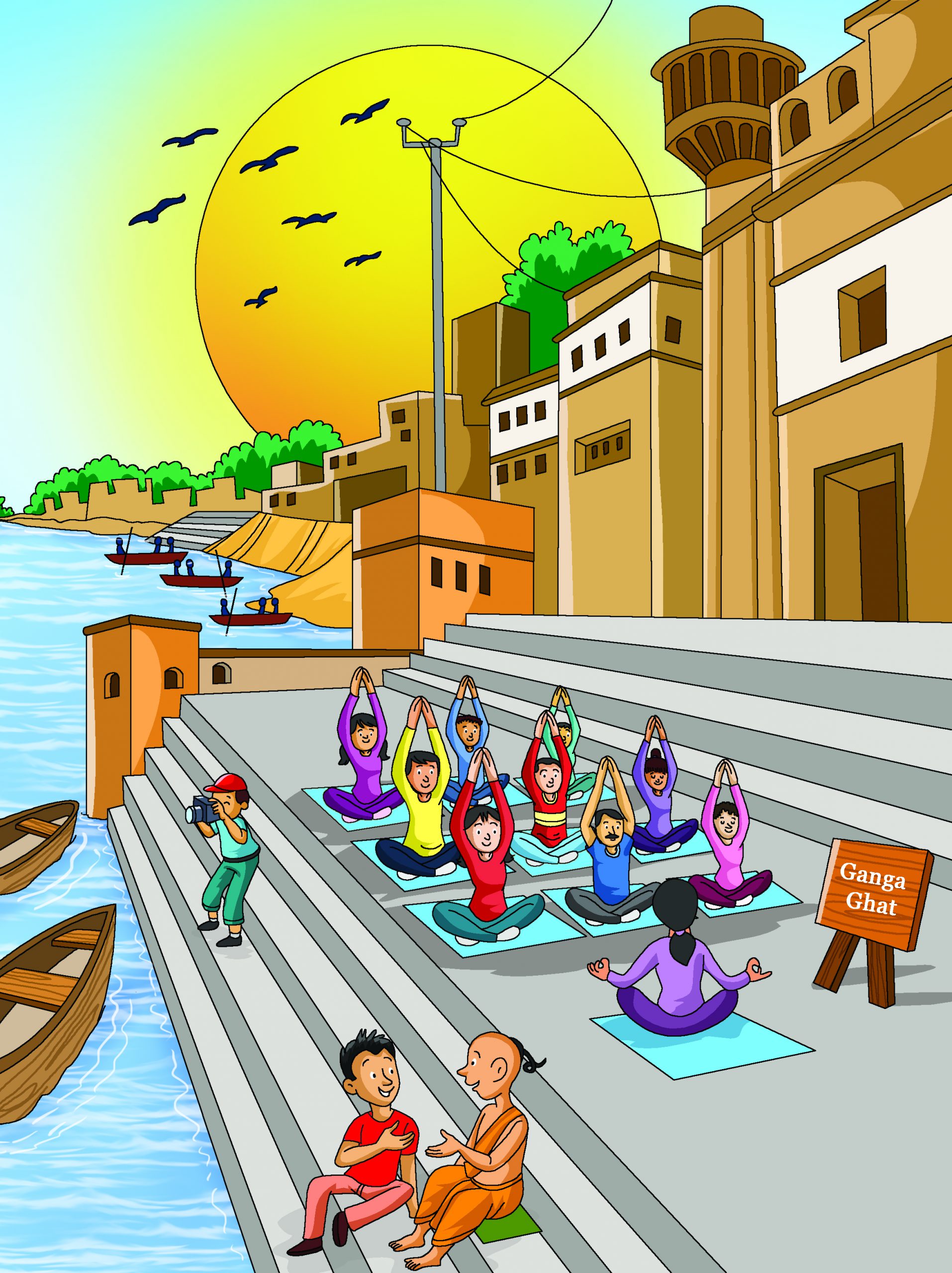
Q1. What is the colour of the yoga mats?
Q2. How many people are practicing yoga in the first row?
Q3. What is the tourist in the red tee doing?
Q4. Where is the instructor seated?
Q5. What is the young boy taking a picture of?
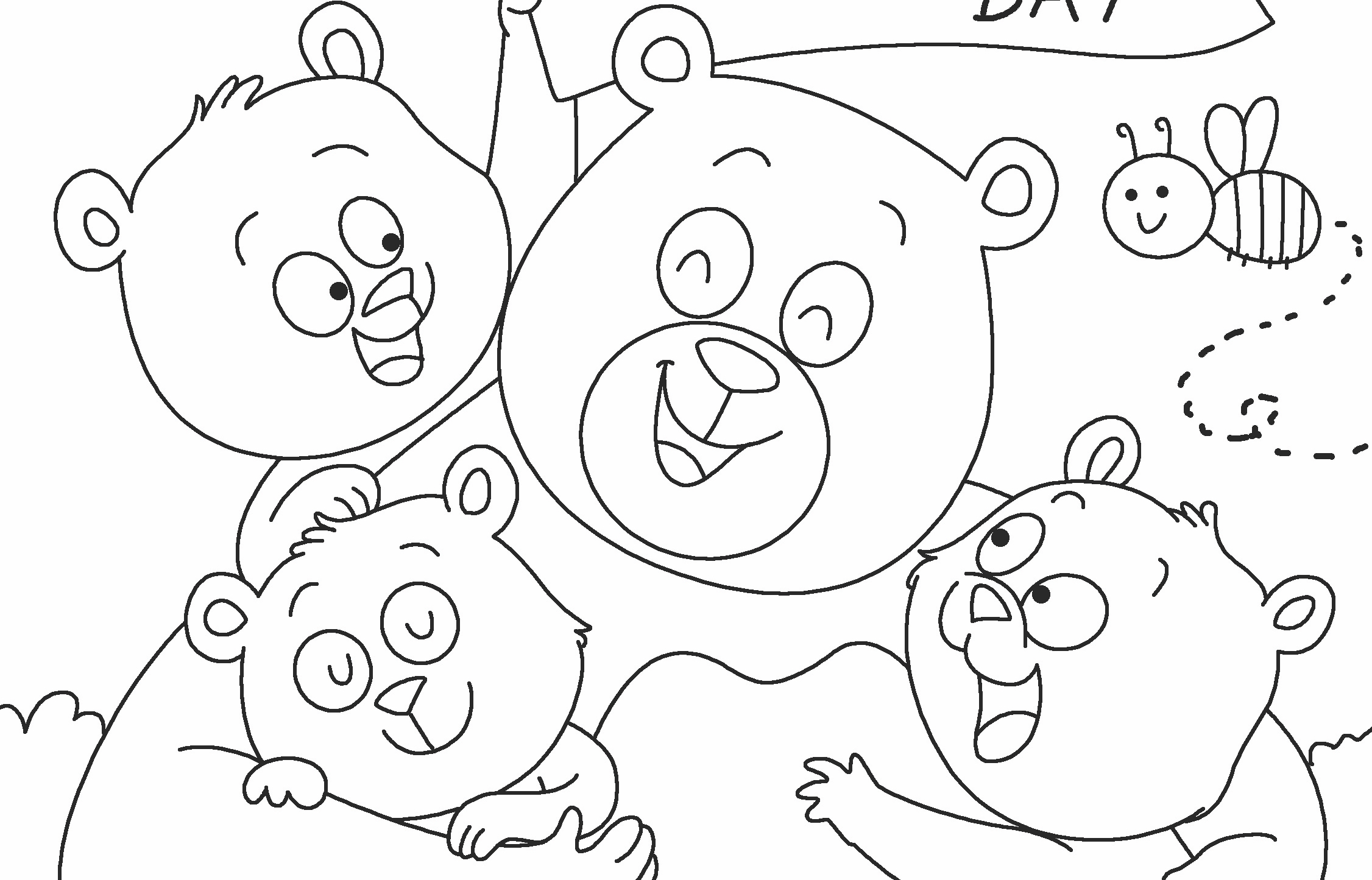


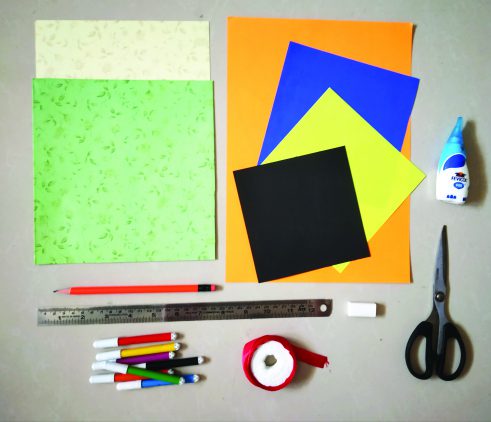
You will need:
Designer paper, colourful paper, ribbon, a pencil, an eraser, scissor, glue, scale and colourful sketch pens.
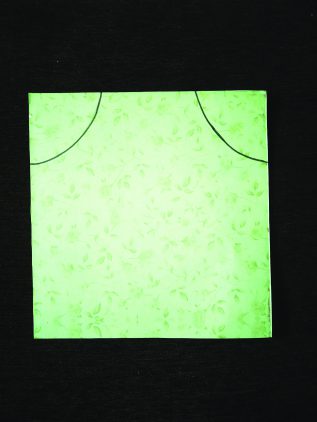
1. For the apron, draw two curves on a square designer paper.

2. Cut out the two curves.

3. For the pocket of the apron, cut a rectangle from another designer paper and apply glue on 3 sides of it.
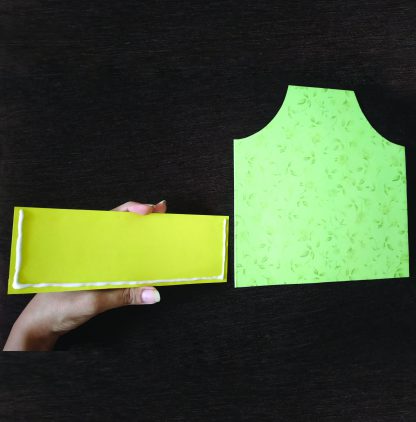
4. Stick the rectangular paper on the bottom of the apron cut-out.

5. Use colourful papers to make cut-outs of a spatula, a knife, a fork and a heart.
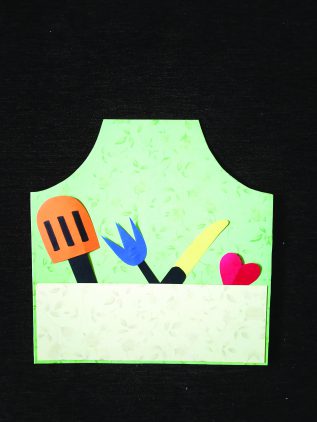
6. Insert the paper spatula, knife, fork and heart inside the apron pocket.
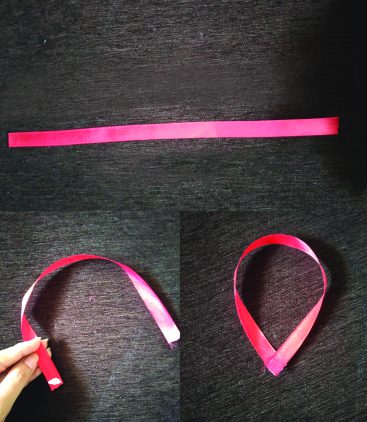
7. Take a ribbon of the length that can go around the neck and cut it. Stick the ends, forming a neckband.
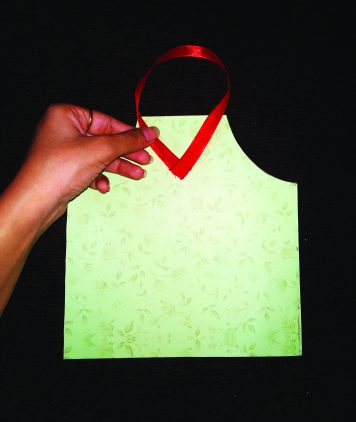
8. Stick the neckband on the backside of the apron.

Your Father’s Day Apron is ready!
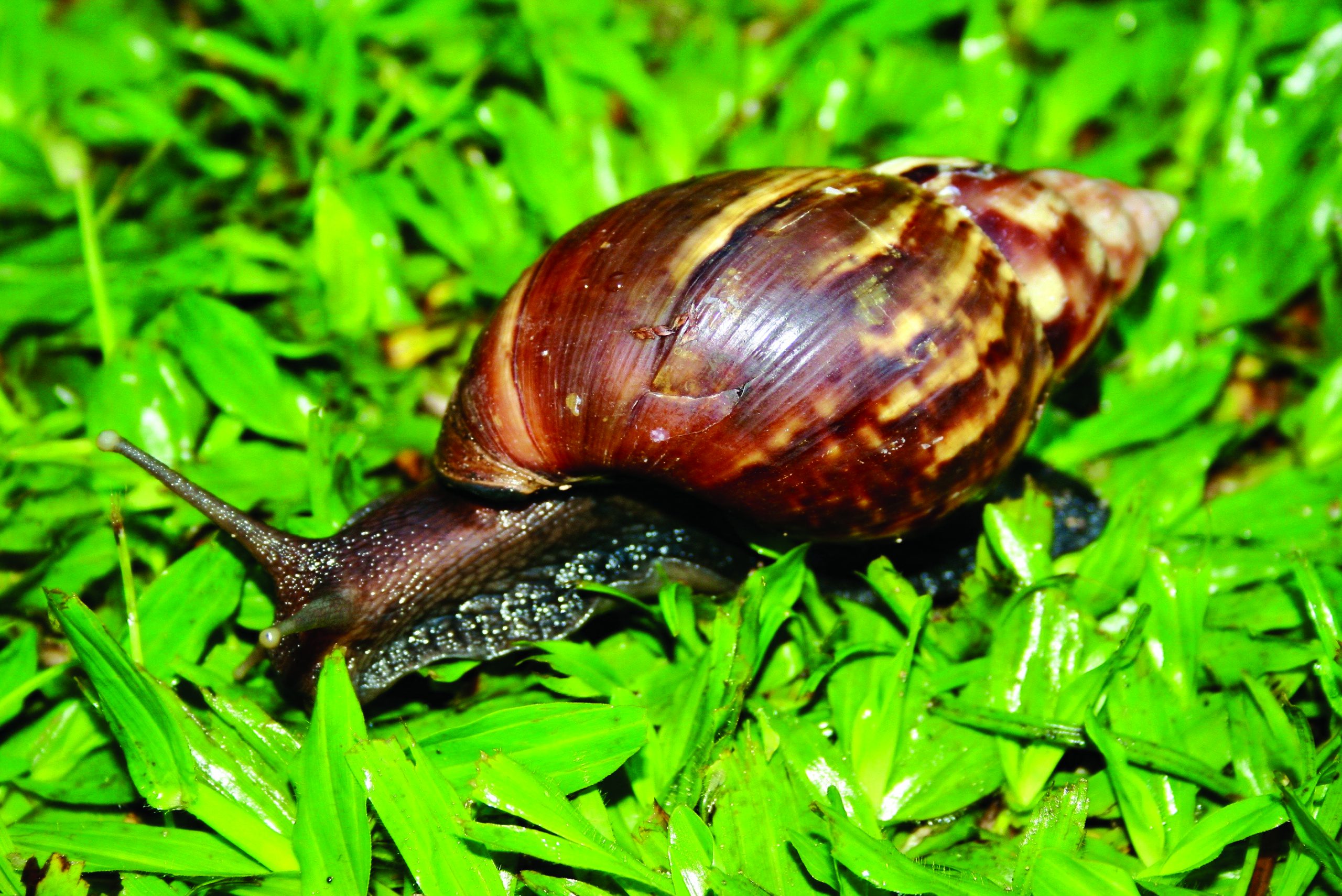
Our days run in cycles of 24 hours. We sleep for about 8-10 hours and work and play for the remaining 14. So, we tend to group animals into a 24-hour cycle when we think about their sleeping pattern.
But the sleeping pattern of snails is quite different compared to that of humans. These gastropods (animals that have no spine and has a soft body with a flat base for moving and often has a shell) do not follow the same cycle as that of humans. Their sleep cycle lasts for 2-3 days.
Their sleeping pattern coincides with the weather conditions. Snails go into a deep sleep to avoid the harsh weather because they are dependent on moisture to survive. They hibernate during the cold winters and estivate during the summer.
During hibernation and estivation, they curl up inside their shell and secrete
a layer of mucous that keeps them protected from external conditions.
So unlike humans, they do not care about the sun’s schedule and don’t need to make up for lost sleep.
Both, snails and slugs are gastropods. However, one thing that sets them apart from each other is that snails have shells and slugs don’t.
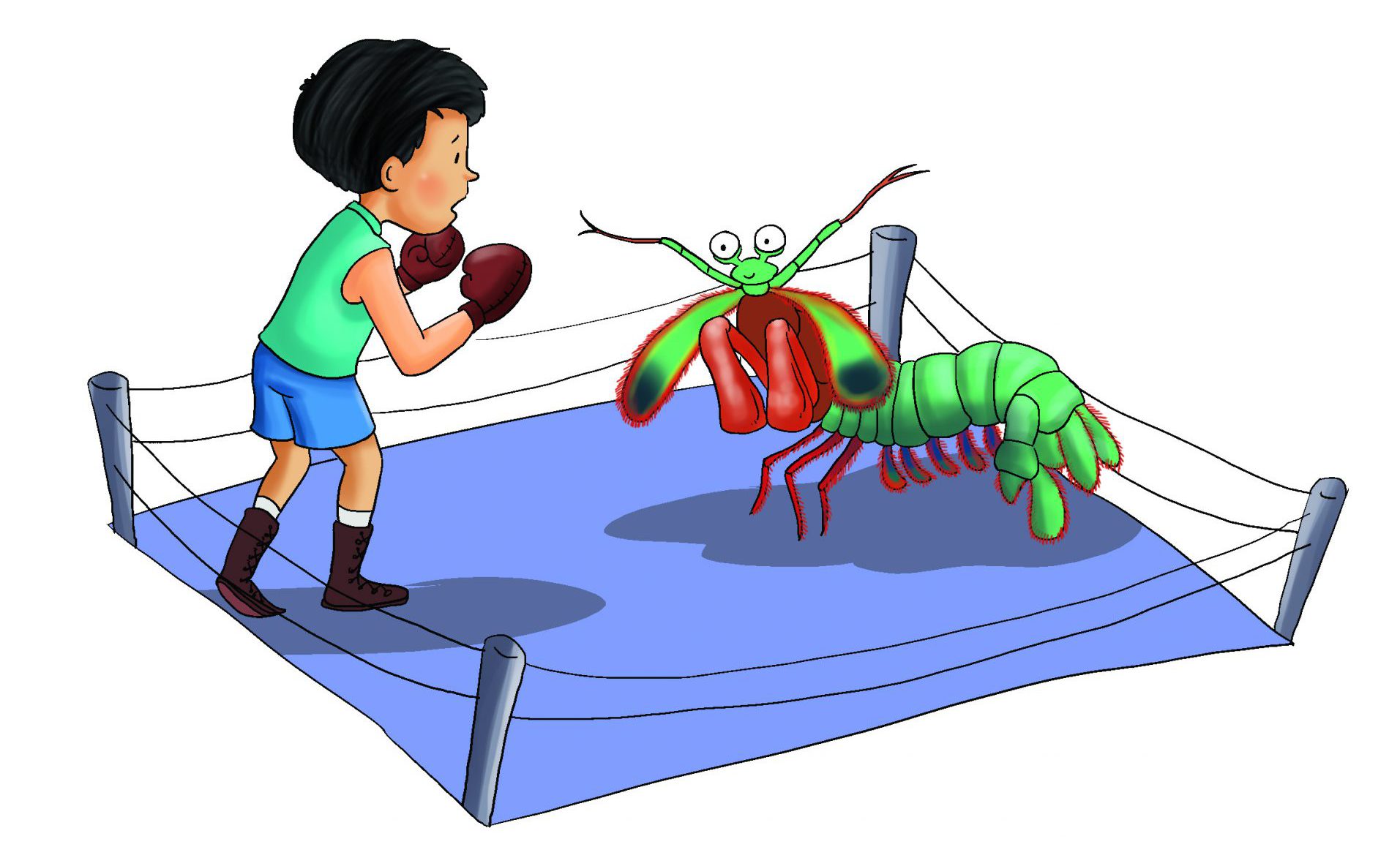
Humans train for years at throwing punches to become good boxers. However, Mantis shrimps have a naturally powerful punch.
Mantis shrimps are found in the shallow waters of the Indian and Pacific oceans. They are very colourful and their size ranges from two to seven inches. They are crustaceans, which means that they are animals with a hard outer shell.
Mantis shrimps can throw the fastest punches in the world. They use their powerful punch to hunt for preys. Their punches can break through crab shells and walls of fish tanks as well.
Their bodies have adapted to throw fast punches. When their upper arms contract, their body’s energy gets stored in a small saddle- shaped part in their body. This acts like a spring that has been compressed. All this energy is released at once, leading the lower arm ahead quickly. Each punch produces small flashes of light, upon impact. These small flashes occur because their claw moves so fast that it lowers the pressure of the water in front of it, causing it to boil.
A Peacock Mantis shrimp’s punches are as fast as a bullet.
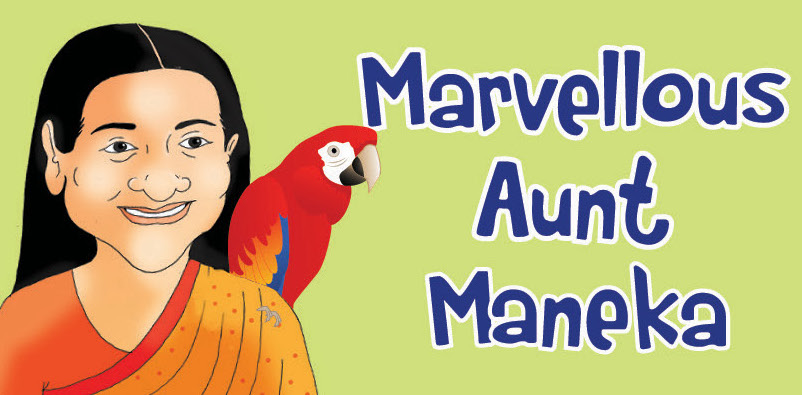
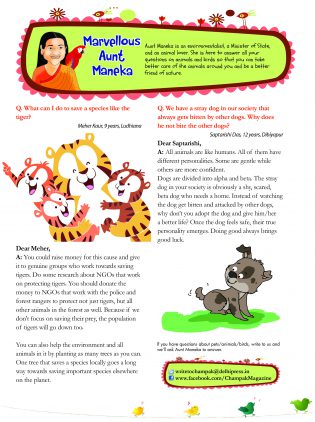
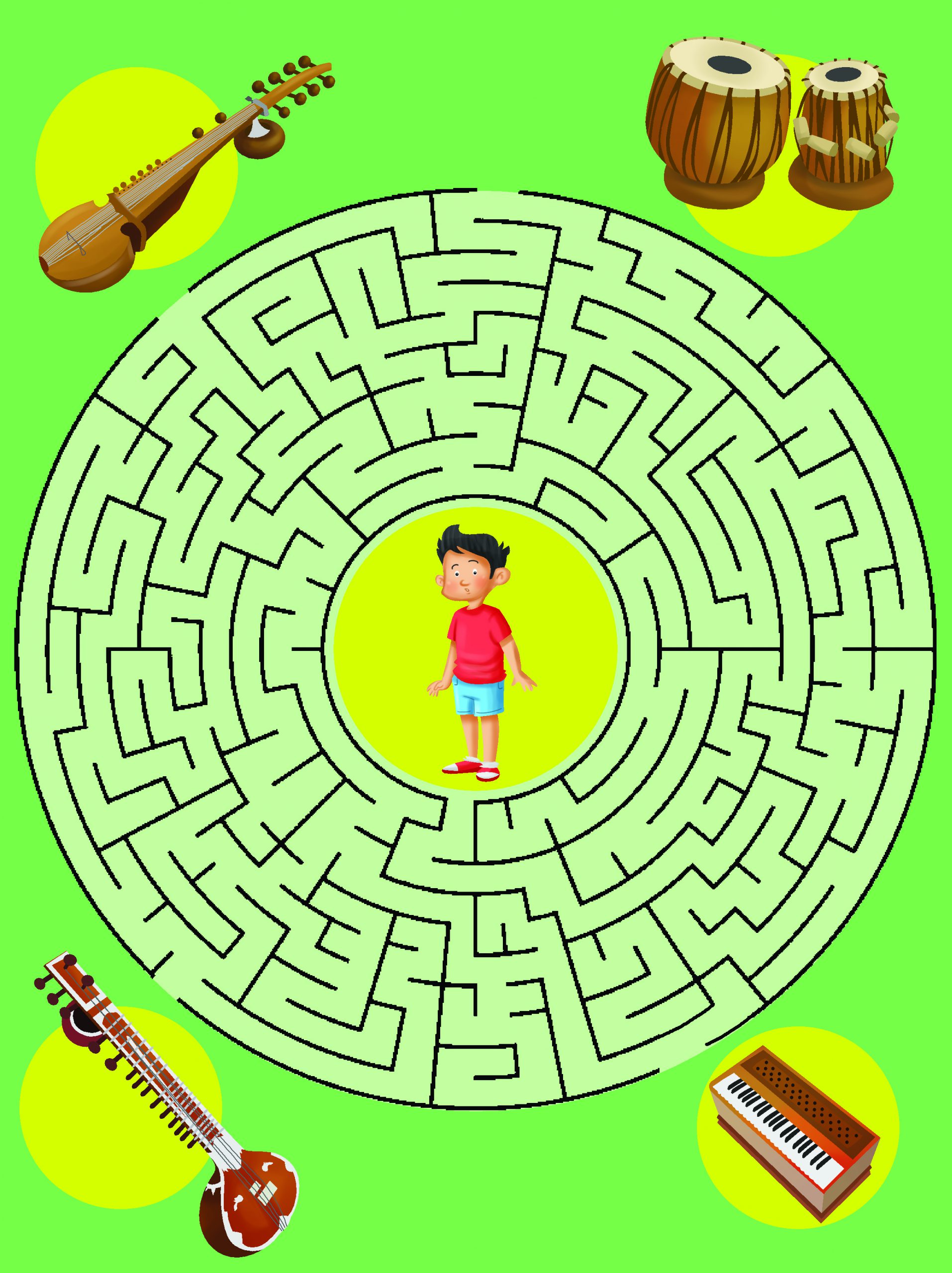
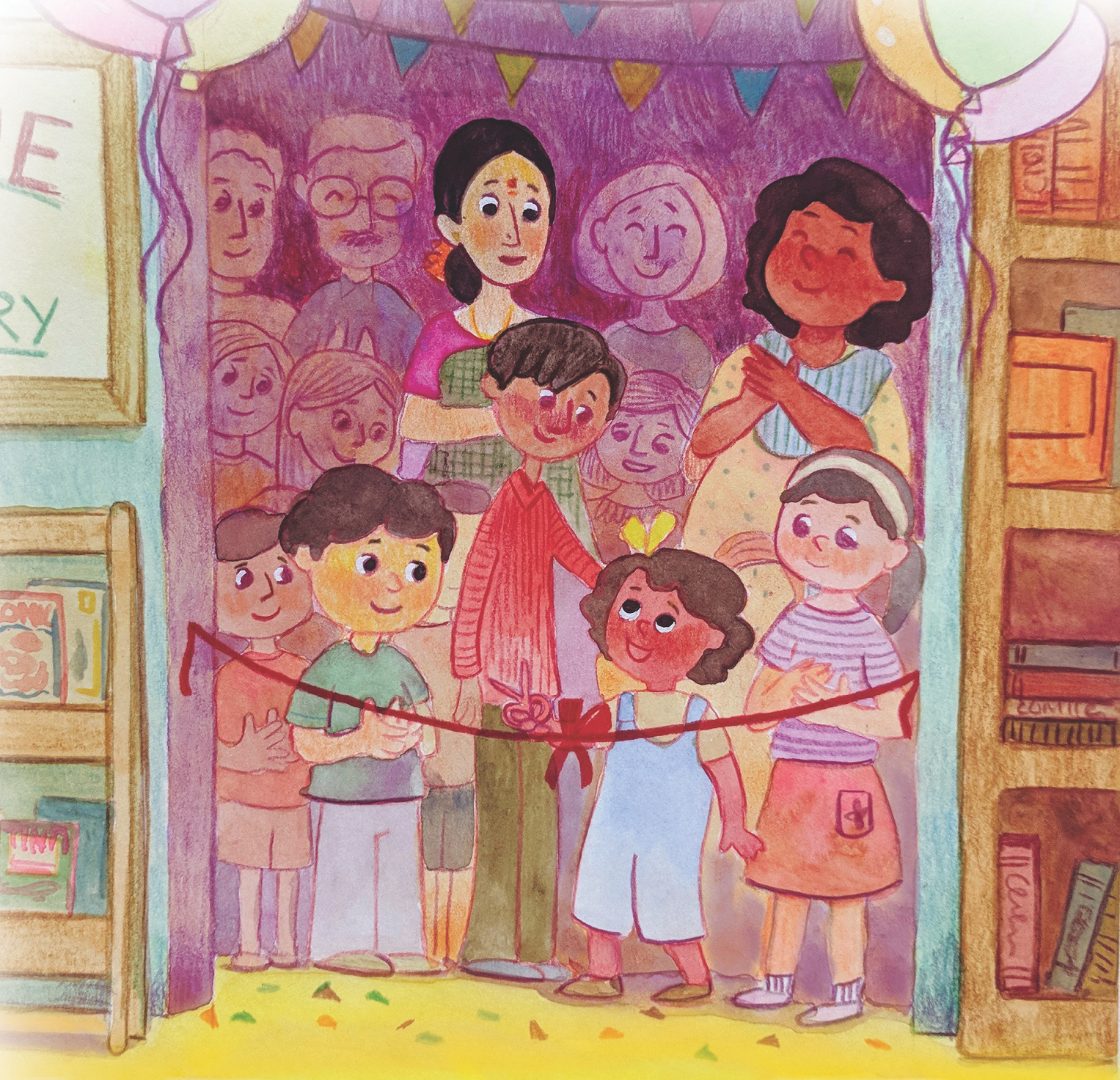
Manav returned home tired after a long day at the playground.
His mother, Mrs. Gopal, was busy cleaning the house.
“Can I help you clean, mother?” asked Manav.
This request surprised his mother as Manav did not like to clean. He even refused to tidy up his own room!
Mother was puzzled, but she gave in, “Alright,” she said.
“I will begin with the study,” said Manav, eager to get going.
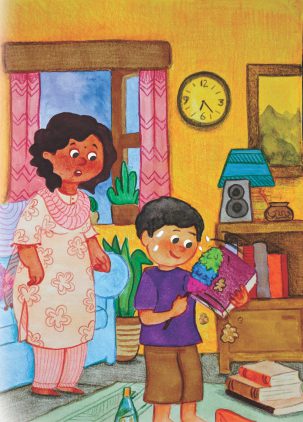
After a three-hour marathon, the house sparkled and gleamed.
Pleased with his effort, mother offered to make Manav his favourite drink―strawberry milkshake.
“No thank you!” said Manav, as he ran out of the house. “I am not hungry mother. Maybe tomorrow!”
Surprised, mother watched the little boy disappear into the distance.
When he returned later that afternoon, Manav looked tired and dirty.
Curious, mother asked him, “Manav, where have you been playing at?”
Manav smiled the widest grin. “Tomorrow,” he said, “I will tell you everything mother!”
The next morning, Manav was up by 6 o’clock. He packed a few sandwiches for himself, and made some for his mother.
Then, before mother could even get a word out, he hurried out of the house.
By now, mother was alarmed!
She picked up the phone and dialed her neighbour, Mrs. Iyer. Her daughter, Sumedha, was Manav’s best friend. They studied in the same class.
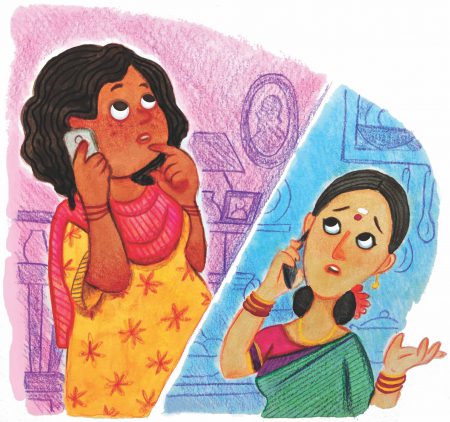
“Mrs. Iyer,” began mother, “Manav, has been behaving in a strange manner since yesterday. I was wondering if…”
“Mrs. Gopal!” Mrs. Iyer stopped her mid-sentence. “I was about to call you!”
“Yesterday, despite my refusal, Sumedha cleaned the study. Then, she came in late for all her meals!” complained Mrs. Iyer.
Concerned, mother said, “I better call the twins, Aarav and Ananya’s, mother and find out what is going on.”
Mother called Aarav and Ananya’s mother.
The twins, who lived two houses away from Manav, were in his class.
The strange story continued. Their mother said that the twins had forced the maid to clean the study yesterday.
Mother waited for Manav to return for lunch. It was 3 o’clock now and he had still not returned.
Anxious, mother decided to look for him. Just as she was about to step out of the house, Manav came rushing in.
“Mother, can you make two bottles of strawberry milkshake right away and bring it to the community hall at 4.30 pm sharp?” asked Manav.
Annoyed, mother did as Manav asked and showed up at the community hall at the requested time.
There she saw little Uttara, standing at the entrance of the hall. Her brother Arudra was standing next to her.
Eventually, the parents started to come to the hall.
At 5 pm, Manav, along with Sumedha, Aarav and Ananya came out of the community hall.
They silently tied a ribbon across the doorway.
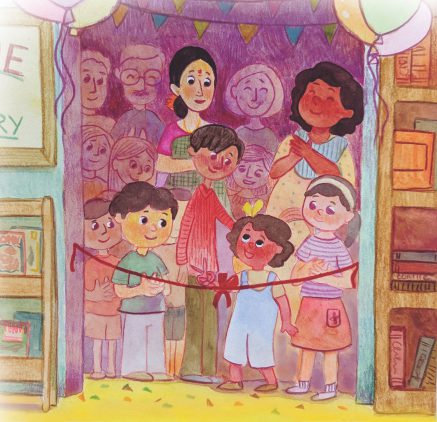
“We are proud to welcome you to the opening of our colony library,” said the children together.
“It is free for all. We have a collection of children’s books, comics, old text books and note books. All the children from the colony are welcome to spend their summer afternoons here.”
Little Uttara cut the ribbon with the help of her brother Arudra. Surprised, the parents cheered and clapped. Mother smiled.
Everybody stepped into the room.
Inside, the children had neatly arranged the books on old, unused racks and each section was labeled.
All the parents appreciated the children’s efforts.
Some even pledged to donate more books to the community library.
Soon, it became the kids’ favourite joint.
They spent their afternoons reading and drawing. Every day a parent sent in snacks, while some even joined the reading sessions.
The summer vacation turned out well for the children. Their plan worked after all.

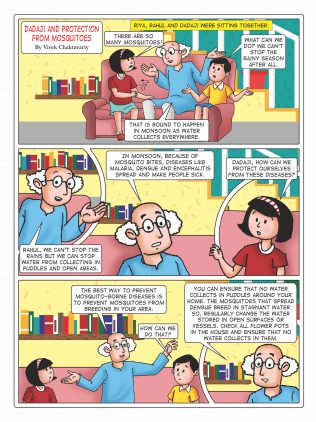
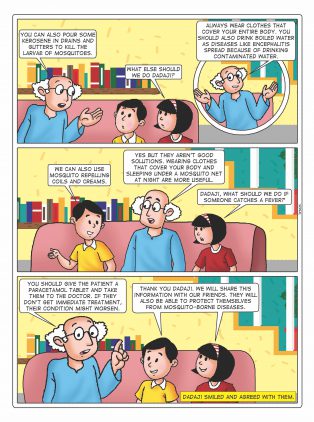

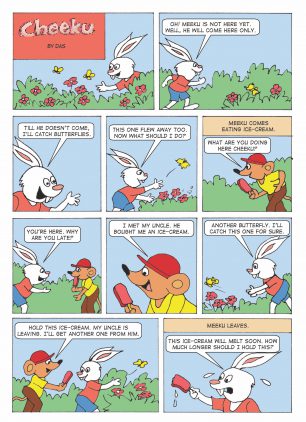
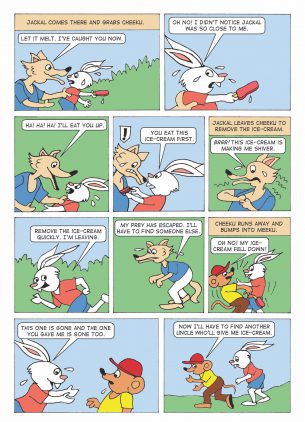
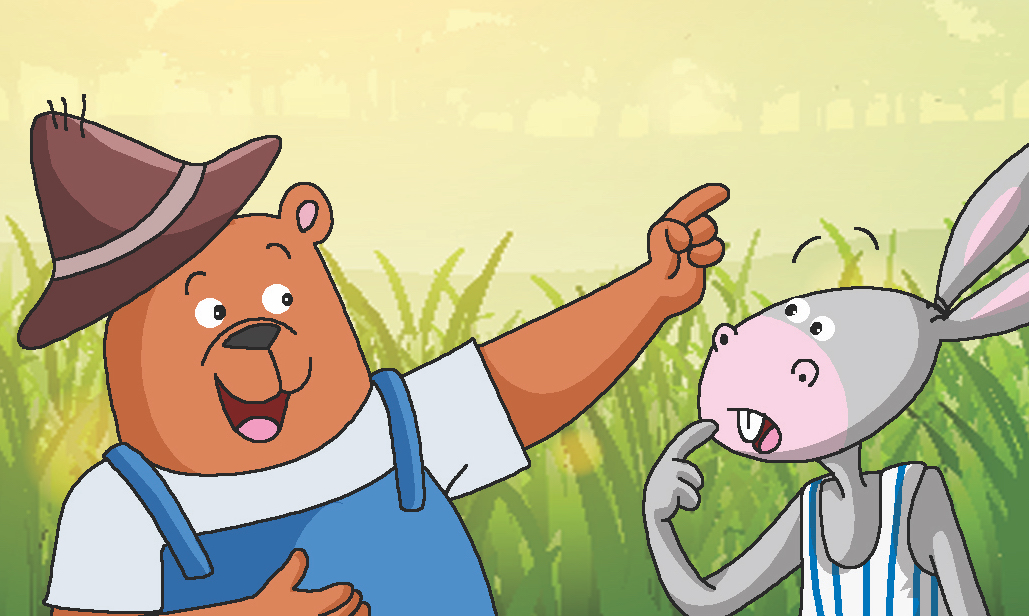
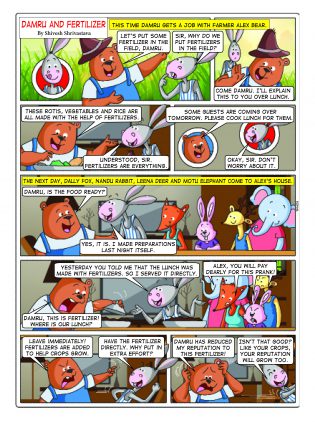
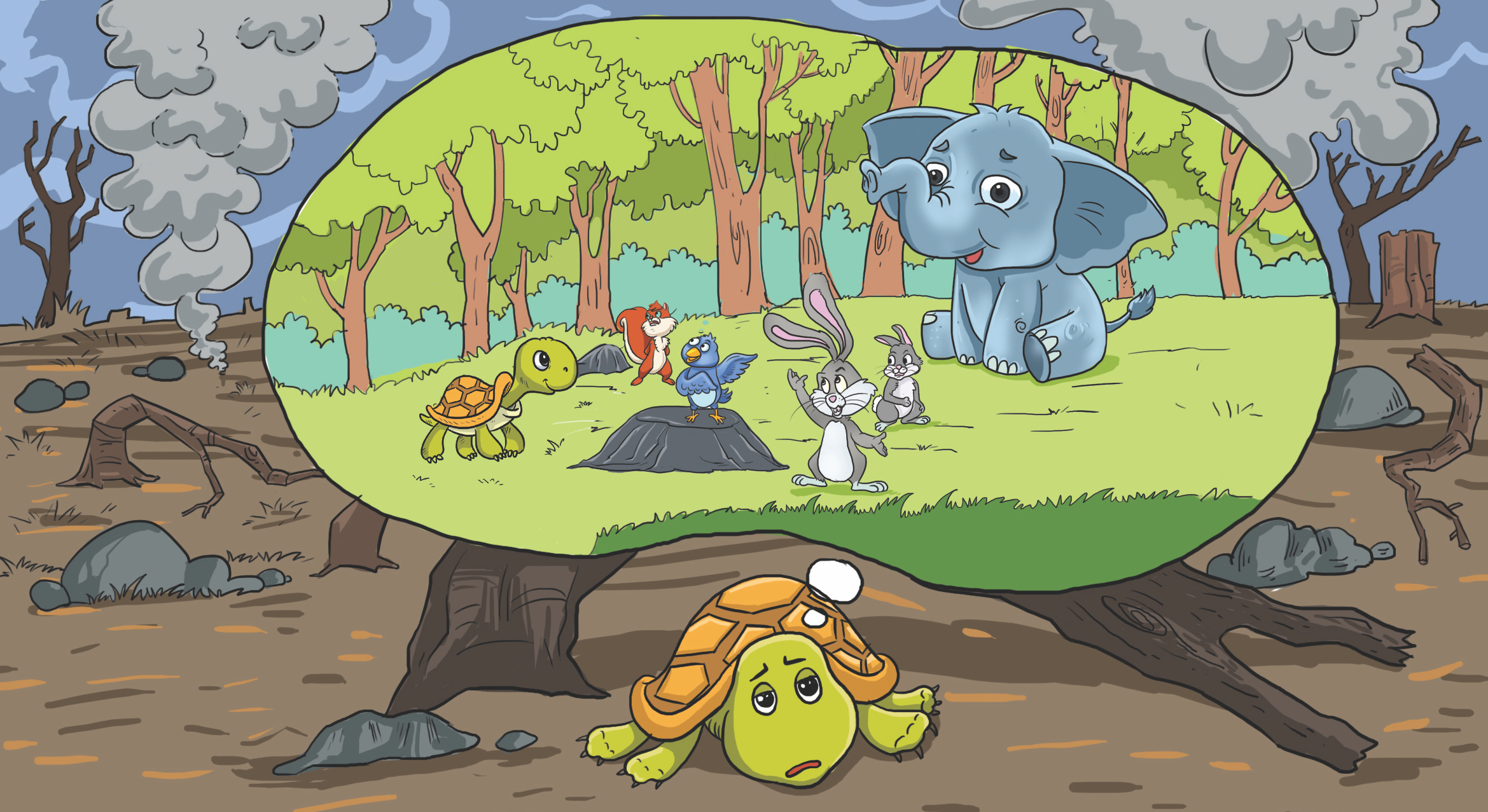
Once, a fierce fire broke out in Green Forest. All the plants and trees in the forest got burnt in the fire.
The animals of the forest somehow saved their lives, left the burnt forest and started looking for more habitable areas. Within a day after the fire, the forest was deserted.
The only animal who did not leave the forest was Jaggi tortoise. He did not wish to leave his native land. He was born and brought up in the forest.
All his friends and relatives left and went away. They all asked him to come with them before they left but Jaggi wanted to stay.
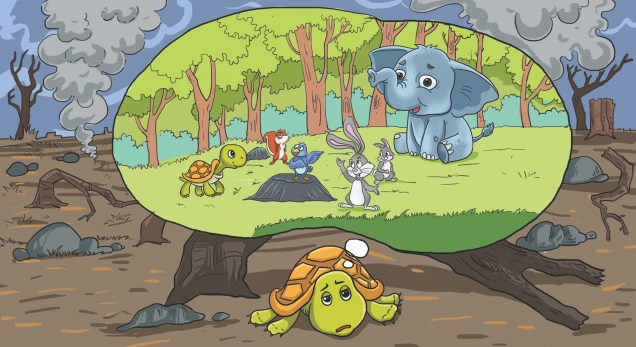
Jaggi managed to survive the next few days on simple meals he could find. But the nights were unbearable. The loneliness of the forest was frightening. He could not sleep. The memory of good old days kept him awake all night.
Finally Jaggi could not bear it any longer and he too decided to leave the forest.
As he was preparing to leave while sitting under the shade of a thick, burnt out tree near the pond, the thick tree shook violently, scaring him.
Two vultures had come and they were sitting on one of the branches of the tree, looking for dead animals to feast on. When they saw the tortoise sitting below, they were pleased.
One of the vultures said to the other vulture, “Tortoise meat is very soft
and delicious.”
“But the outer covering shell is hard and difficult to break open,” replied the other.
“I have a plan by which we can take this tortoise and break his shell,” said Tom, the first vulture, looking at Jaggi.
Jean, the second vulture, asked eagerly, “What is the plan? Tell me quickly.”
Tom said, “Have you heard the story about the talkative tortoise who was carried by two birds on a stick? He was holding it with his mouth and he fell down when he opened his mouth to speak. We too will offer to fly him to his friends by holding a stick in his mouth. Then we will drop him down and enjoy a good party.”
Jean said, “Let’s not delay our plan. Come, let’s go.” Both of them flew down to where Jaggi was sitting.
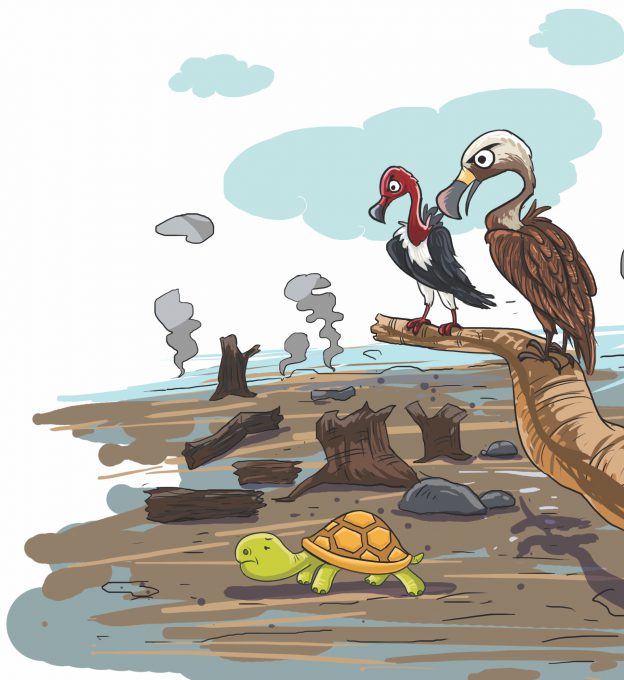
“Where are you preparing to go, Jaggi?” asked Tom in a friendly tone.
“After our forest burnt down, all the animals left to go to other places. I did not want to leave this forest but now I feel I too need to leave,” said Jaggi.
Tom said, “With your speed, you may not reach your friends even after a year.”
Jean said, “Meanwhile, you may die of hunger and thirst because you will not be able to find water and food on the way as the land in between is dry and barren.”
“Are my friends so far away?” asked Jaggi.
“Yes, they live very far,” both the vultures said together.
Jaggi sadly said, “That means I will not be able to reach them.”
“Not if you were to walk to them. But you may reach them if you fly,” said Tom flapping his wings.
Jaggi became sadder and said, “Why are you making fun of me? You know I cannot fly.”
“If you agree, we can fly you to your friends,” said Tom looking towards the sky.
“How will you hold me?” asked Jaggi.
Tom picked up a stick and explained, “You hold this stick in your mouth. We two will catch the two ends of this stick in our paws and fly you to your friends.”
Jaggi agreed to the idea.
The vultures brought a strong stick and asked Jaggi to catch it tightly in the middle by his mouth.
But suddenly just then, the wind started blowing strongly and the thick burnt tree started shaking violently. The next moment it tilted and was about to fall on the two vultures.
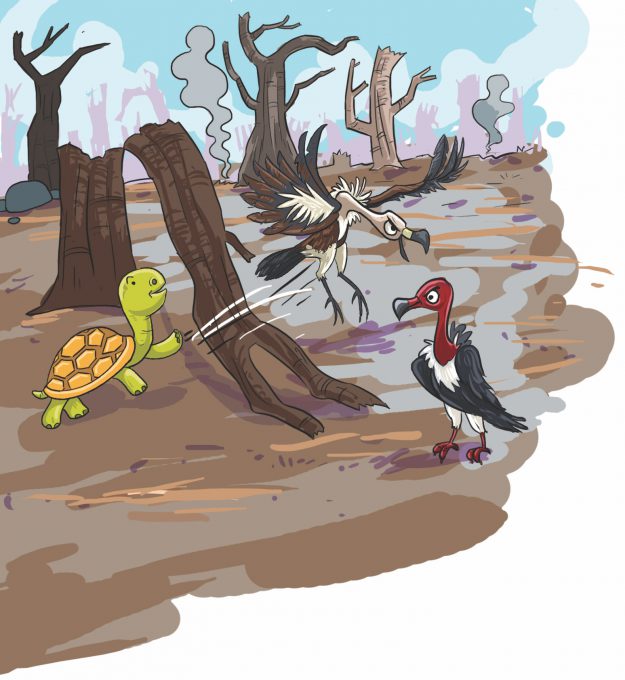
When Jaggi saw the tree falling on the vultures, he rushed and pushed them away. Both got saved but the tree fell on Jaggi who became motionless. Both the vultures were shocked to see this.
“I feel sorry and ashamed that we planned to take the life of such a good and virtuous tortoise. He sacrificed his life to save our lives,” said Tom sadly.
Jean started sobbing. He said, “Jaggi died to save us.”
Just then Jaggi came out from under the tree and said, “There is no need to cry. My strong shell has saved me. I am perfectly alright.”
“Oh great! You are safe! So wonderful!” they both said joyfully.
“We are very happy to see you alive. Come, let’s go. You will be with your friends,” said Tom.
“No friends, I have decided that I will not leave the forest, my motherland. I will start planting new seeds and saplings and make this forest green again,” said Jaggi, filled with positive thought.
“Like you, your ideas also are great. Both of us will also help you in it,” said Jean.
“Yes, we are with you,” Tom joined in.
From that day onwards all three of them started planting new saplings.
When Jaggi’s friends and relatives heard about this, many returned and joined in making the forest green again.
In a few months the whole forest got filled with small green plants and trees. The animals too looked forward to the day when the forest would become their old forest with big trees and shade.
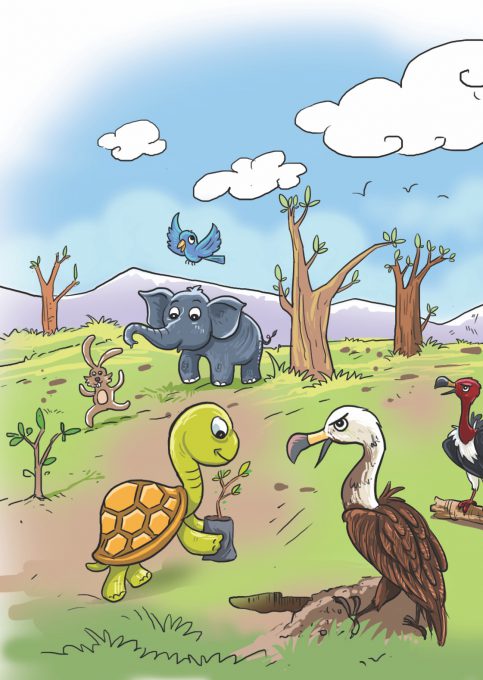
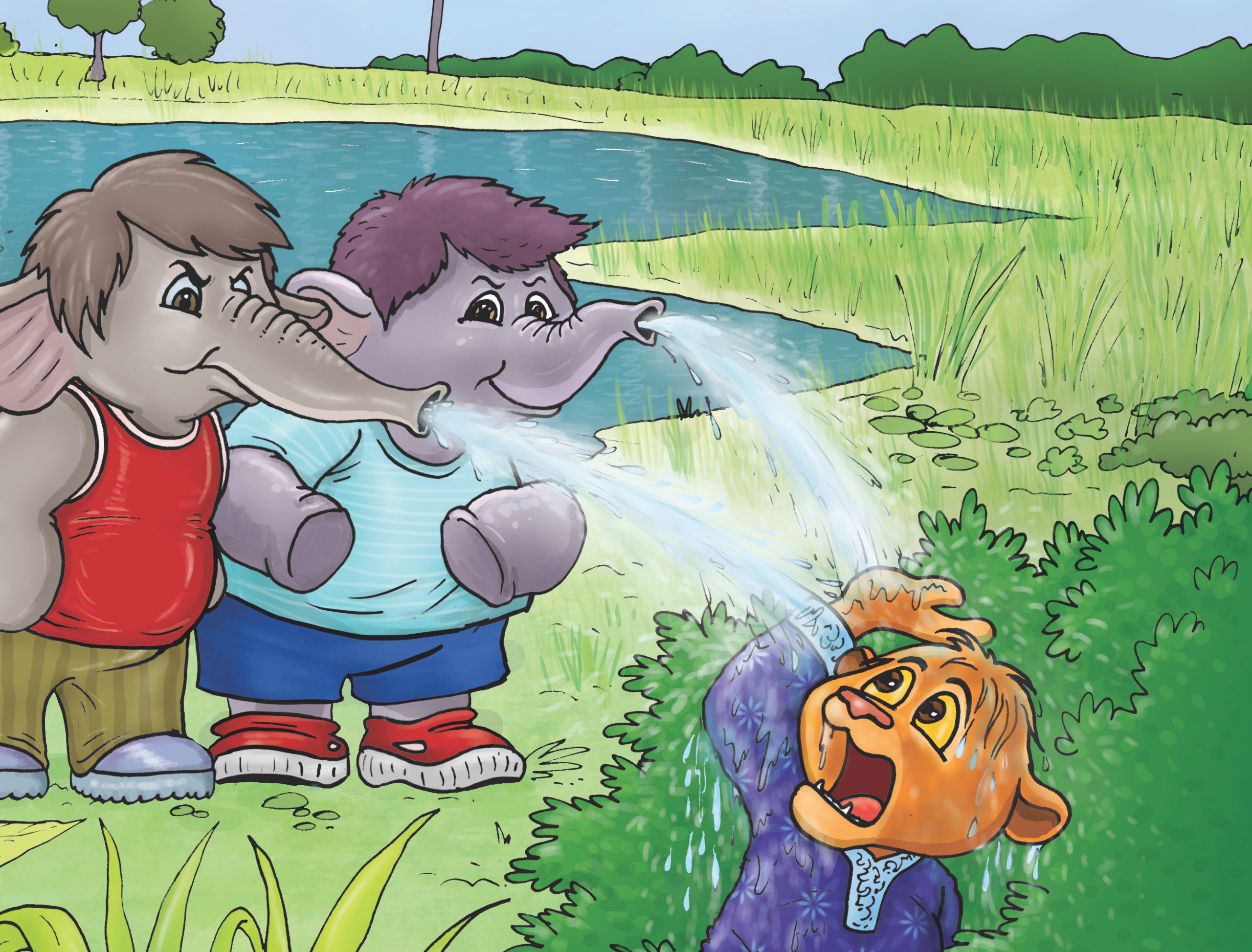
Leo lion did not want to become the king of the forest because he was very timid.
“Please dad, I don’t want to become the king,” he often told his father.
“But son, it is we, the lions, who have to become the kings. Now I have become old. You must slowly start taking up the responsibilities of this forest,” Papa Sheru explained to him with love.
Leo however was so timid, that he was not ready to become the king at all. “I
am tired of listening to my father,”
he thought.
One day he told himself, “It is better that I go away from this place and hide somewhere. Then I wouldn’t face any trouble.”
As he said so, he hid behind the bushes. There was a mango tree near the bushes which had some monkeys sitting on them. They saw Leo hiding there.
“Look, our future king is hiding here.” A tall monkey pointed
to friends.
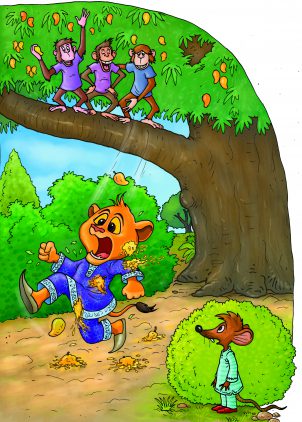
“Good. Let’s make fun of this timid creature,” said a monkey.
He immediately plucked several mangoes and distributed among his friends.
“Let’s get started.” Saying so, he threw one mango towards Leo. On seeing this, all the others too started throwing mangoes on Leo.
“Oh dear.” Being upset with this sudden attack, Leo ran away from there.
“Timid… Timid…” shouted the monkeys as they clapped.
“How wild are the animals in this forest,” Leo thought to himself and felt sad. But he did not get angry. He feared that the herd of monkeys may attack him. So, he ran away quickly and came to the forest’s pond.
“Hey look, our future king is hiding here!” exclaimed the children of two elephants who were drinking water from the pond.
“If he is so timid, then who will save us from our enemies?” They started talking to each other.
“You are right. What is the difference whether he is here or not?” said the second elephant.
The young elephants made fun of him. They filled water in their trunks and splashed it on Leo who was still hiding.
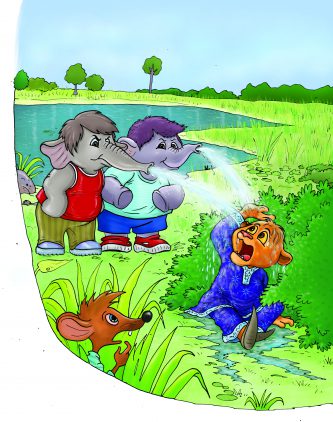
“If you continue to hide, then we will give you a bath and also arrange meals for you,” Both of them laughed and said.
Leo got very angry when suddenly they showered water on him. However, he was afraid that if he expressed his anger, then the elephant would not spare him.
“Oops! I need to escape from here as well.” Leo immediately ran towards the mountain.
“Timid… timid…” The elephants teased him on as he ran.
Once at the mountains, Leo was at considerable peace. He laid under the dense cover of a tree.
“It’s fine here. No one will disturb me,” he thought.
A few crows were sitting on the tree.
“Hey look, our future king is hiding here,” one crow said looking at Leo.
“Let’s teach a lesson to this coward,” said another crow, as he reached out for him.
Now the mischievous crows began to bother him. Some started crying near his ear while some others started poking him with their beaks.
“What’s the problem?” Leo got upset again. He was very angry with the crows for teasing him. When his patience broke, he roared aloud.
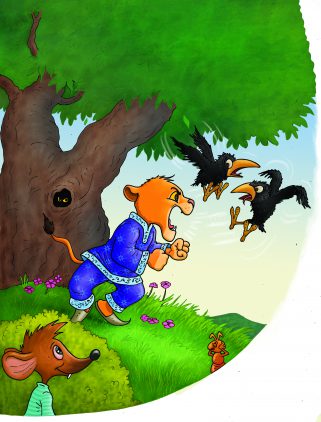
Hearing him roar, the crows flew away in fear.
Leo told himself, “I am a lion and I have to show courage like a lion. I can’t live in fear. I am ready to become the king of this forest.” He roared again and returned home.
“Dad, I am ready to become the king.” When Sheru heard this, he embraced his son with pride.
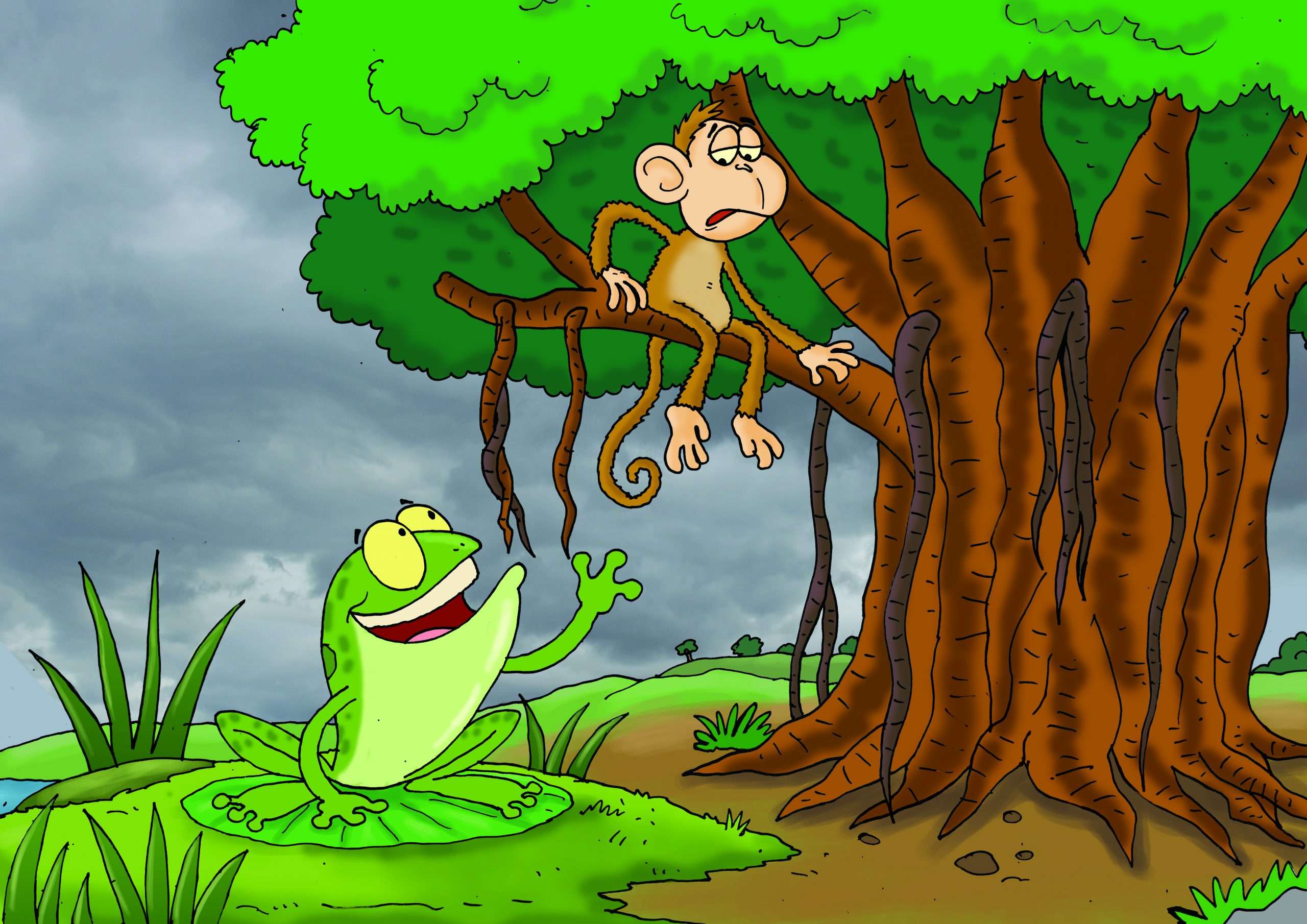
There were black clouds in the sky. The sight made Franky frog very happy.
“Looks like the monsoon is about to begin. How I long to go splish-splash in the rain. It will be fun!” thought Franky.
Monty monkey was sitting on a branch nearby. He had been watching Franky for some time now. “Franky, why are you looking at the sky so happily?” asked Monty Monkey.
“I’m looking at the clouds, silly. It is going to rain after all!” replied Franky.
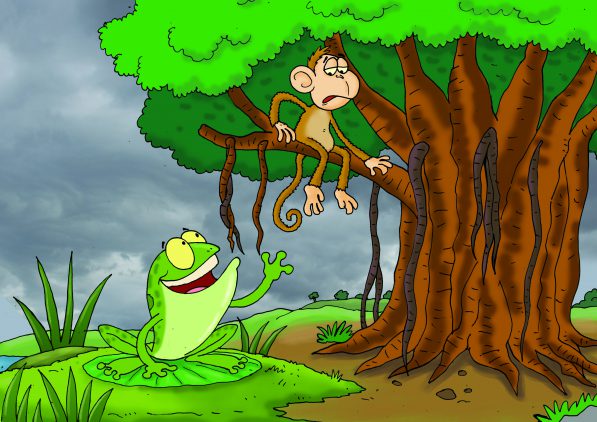
The word ‘Rain’ made Monty shiver.
“Oh! I suffer terribly during the rains. My home in the tree rattles and shakes during a storm. I get drenched and then catch pneumonia!” exclaimed Monty.
“But with the rains comes relief from heat. Dry fields, ponds and lakes get filled with water,” said Franky.
“Urgh!” said Monty, in disgust, as he bounded off. “I don’t like the monsoon!”
Franky decided to take a stroll. Soon, he met Gally goat who was in a hurry.
“Hey, Gally!” called Franky. “Where are you off to in such a hurry?”
“Can’t you see it is going to rain?” replied Gally, irritated. “If I leave my food out in the open, it will get wet and spoil. I must get it home quickly.”
She grumbled, “And I left my clothes out to dry. If it rains, they will get wet too. All my hard work will go to waste!”
“The monsoons are not that bad, Gally,” said Franky. He explained, “Hasn’t the grass in your garden dried up? Soon, when it rains, it will turn green again and it will taste better!”
“Stop with all this nonsense about the rains, Franky. It isn’t as fun as you think!” said Gally, as she went into her house, irritated.
“Why is everyone so unhappy with the rains?” thought a puzzled Franky.
Soon, he came upon a colony of ants. They were working swiftly. There he saw his old friend, Annie ant.
“Hi Annie!” shouted Franky. “You seem terribly busy.”
Annie ant looked up. She was carrying food into her home. “Yes Franky. As you can see, it will rain soon. We need to stock food in a safe place.”
“I heard that ants work harder during the rainy season. Is that true?” questioned Franky. He felt a little bad for the ants as he imagined that they didn’t get to enjoy the wet weather.
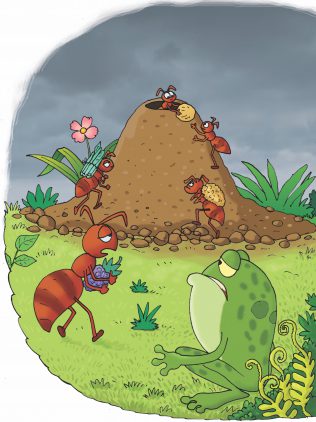
“Yes, we do not like to waste our time. But the monsoons create new problems for us as we cannot go out in search of food. We are forced to stay home all the time,” explained Annie.
“Oh!” uttered Franky.
“There is a lot of work left to be done, Franky. I will talk to you later,” said Annie, as she disappeared into the anthill.
Franky was now bothered. “Are the rains really that troublesome? No one seems to want rain except me,” thought the little frog.
By the time he returned to his home near the pond, every inch of the sky had turned grey.
Soon, there was a gentle pitter-patter on his roof. The rains had finally arrived!
Franky hopped out of his house. He was happy to see the raindrops splatter all around. When suddenly, he said, “I like to get wet in the rain. But other animals fall sick and face problems. If my friends have problems with the rain, I will also stay inside my home.” He went back inside his home.
Franky sat by a window. He was happy watching the drops of rain trickle down. But, he did not go out.
“Franky!” He suddenly heard Monty call out to him.
“We have been looking all over for you. And you are hiding at home!” yelled Gally.
“Come out! Don’t hide inside! We all have come out to play in the first rain with you,” said Annie.
She rapped at his door. “You love the rain and yet, you are sitting inside!”
Franky was surprised! He quickly hopped out of his home.
When Franky went outside, he saw all the animals of the jungle enjoying the first rain.
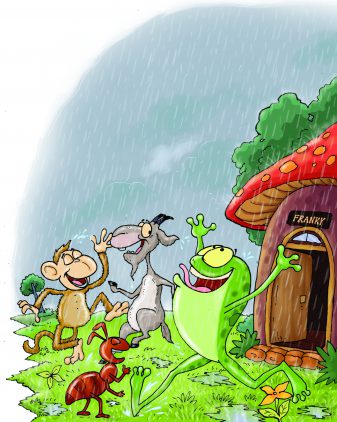
Franky started saying, “For you all, I was…”
“We all know it”, interrupted Gally. “Should I tell you one thing? Monsoon is not that bad, you know. We are enjoying getting drenched.”
Franky danced happily after hearing those words. He also started enjoying the first rain.
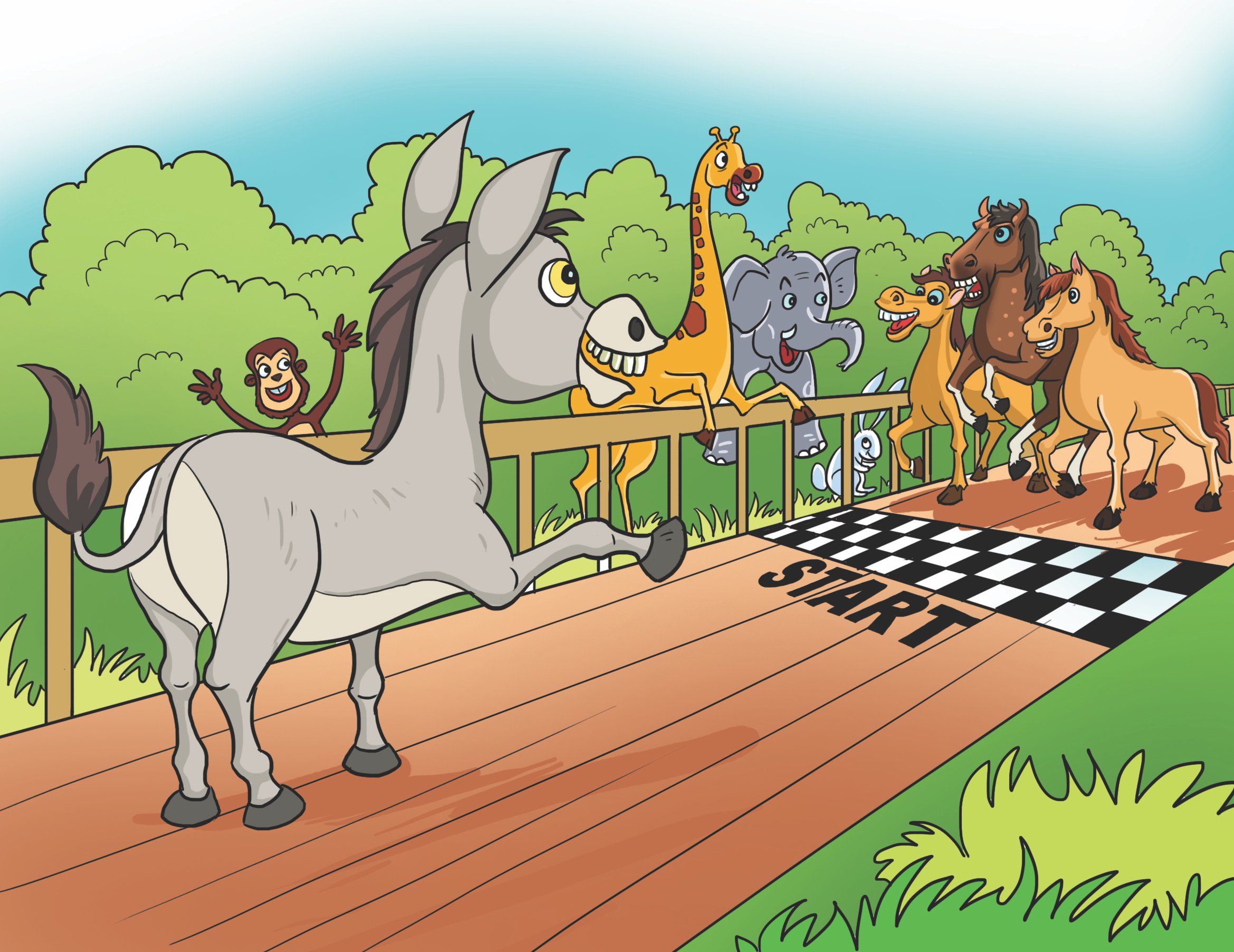
A race was to be held in Chanchalvan forest. All the animals in the jungle had gathered to watch the race. The horses that were to run the race, assembled on the race track.
Though they competed with their own kind, each thought they were better than the other.
Snorting and pounding their hoofs, they glared at each other.
Then, just as the referee was about to blow the whistle and start the race, Bhondhu donkey ran in.
“Stop brothers!” he yelled. “I would like to take part in this race.”
The crowd roared with laughter. Yet, it did not discourage Bhondhu.
“I have practised long and hard, running at the speed of a horse. I believe I run fast,” said Bhondhu.
“Oh! Now a donkey wants to compete with us!” thought the horses.
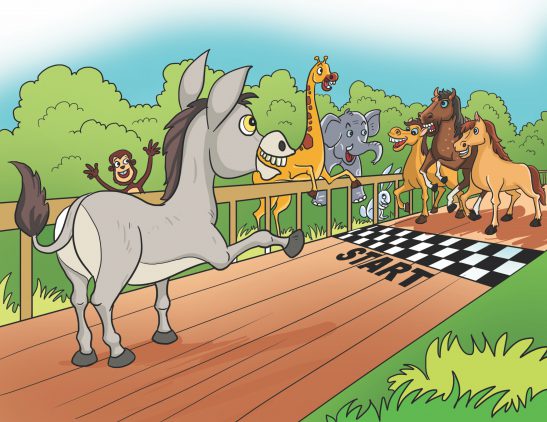
Till then, the same horses that looked at each other with bitterness, suddenly united.
They now turned their bitterness towards one target ― the donkey.
For now, it was not a question of which horse won. Rather, it became a matter of pride for the family of horses.
“This is beyond your skills, Bhondhu. Everyone isn’t as capable as us. Donkeys in particular are no match,” said Hiroo horse. “And if you were, you wouldn’t be called a donkey.”
Again, the crowd burst out laughing.
“You are just that ― a beast of burden,” continued the proud Hiroo. “Do what you are born to do. Don’t make a fool of yourself!”
The horses cheered him on.
“Okay. If I lose, I will leave this forest forever,” said a confident Bhondhu.
Now, this made the spectators curious. They all scrambled to get a better view of this strange competition between a donkey and the horses.
The referee fired the starting shot. Off went Bhondhu and the rest of the horses.
While the horses ran well, Bhondhu surprised all. He overtook each horse.
Even Hiroo, who was a champion racer, couldn’t beat Bhondhu. Finally, Bhondhu won!
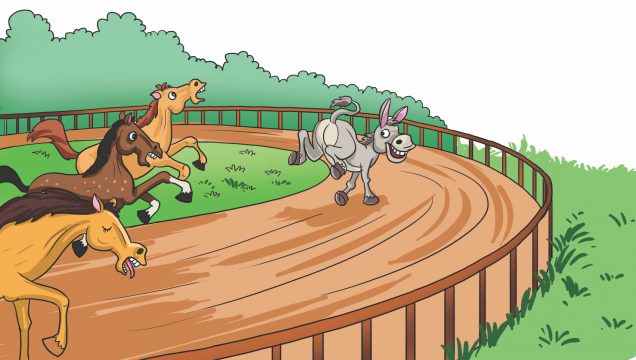
As a prize, he was gifted a cycle.
The happy Bhondhu went up to the horses and said, “Brothers, so what if I am a donkey? With hard work and sincerity, anyone can be successful.”
Soon, the race became the talk of the town. The animals made fun of the horses, while everyone stopped making fun of donkeys.
Bhondhu, however, was not happy with the situation.
“It’s nice to hear everyone praise donkeys, after I won the race. But it’s not fair to make fun of the horses either,” thought Bhondhu.
One day, Bhondhu was cycling in the jungle, when suddenly he was surrounded by a group of horses.
“So, you are the donkey that outran us. How about running a race with us, right now?” said one of the horses.
“The other day, it was an actual race. I have no intention of competing with you now,” said Bhondhu.
“Now, you insult us by saying that you are not in the mood to compete?” said a familiar voice.
It was Hiroo. He stepped up from behind and pushed Bhondhu off the bike.
Bhondhu realised that the horses were out to seek revenge. He quickly took off as the horses chased him.
While he could run fast, Bhondhu could not run continuously and was getting tired quickly.
While the horses, as they were used to running all their lives, did not tire easily.
Soon, dizzy and tired, Bhondhu tripped and fell into a pit. There he lay unconscious.
The horses stopped at the edge of the pit. Seeing him unconscious, they left.
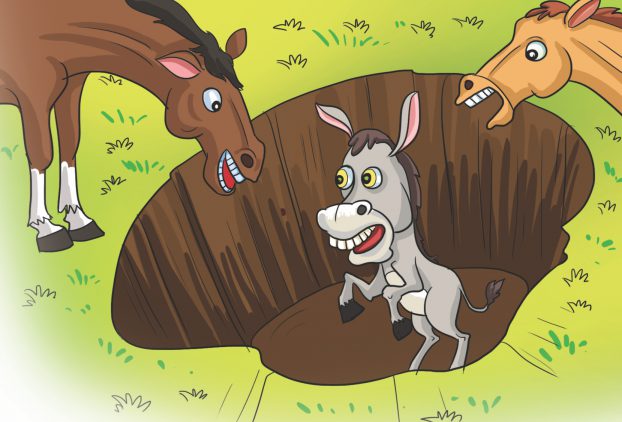
Soon after, Bhondhu gained consciousness and realised that he was badly hurt. He could not get out of the pit and there was no sign of help.
Suddenly, he spotted a small bird in the sky. It was Simi.
She recognised Bhondhu and flew down to him. Bhondhu told her all that had happened.
“The horses are bent on harassing me, because I won a competition against them. Is winning such a big mistake?” asked Bhondhu, in pain.
Simi smiled. “You have broken an age-old tradition. In doing that, you have made enemies with the bearers of that tradition,” said the wise little bird.
Bhondhu looked troubled.
Simi explained, “All the animals think donkeys are stupid. However, horses are treated like kings. They are believed to be ‘high’ and you, ‘low’. By winning the race, you turned the tables. You proved that a ‘low’ animal is also capable of speed – a quality that horses take great pride in.”
She continued, “They are insulted and their pride is at stake. They will try to defeat you, not only on competition grounds, but in real life too.”
“You mean I have invited trouble and made enemies by challenging them in the competition?” asked Bhondhu.
“Bhondhu, those who hold a ‘higher’ place in the society, blindly believe they deserve respect,” said Simi. “They also believe that anyone from a ‘lower’ section cannot challenge or hold such a position. Nor can they snatch their honour at any cost.”
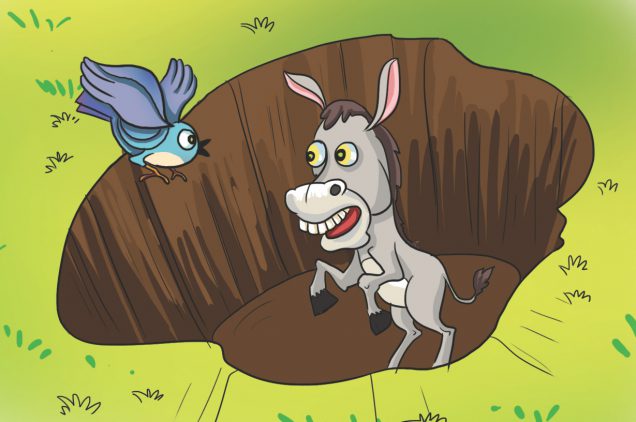
“I never thought about my actions in such a way,” said Bhondhu, worried.
“The winner of the race is now worried about his plight!” said Simi.
“Bhondhu, are you not happy that you have changed the outlook of your entire community? Wasn’t it wrong that everyone looked down upon donkeys? Now, because of your actions, no one laughs at a donkey.”
Bhondhu thought for a while. He replied, “No, dear Simi, I am in fact very happy, but…”
Simi stopped him mid-sentence and said, “If you are really happy, stop worrying. Instead, fight to retain your position so that in the future, no donkey will ever be discouraged. If you challenge someone, you need to be brave to face that person anywhere. Else, they will leave no leaf unturned to trouble you. Do you understand?”
“Yes Simi, I should be brave and ready to face the horses,” said Bhondhu courageously. “Now, can you please help me out of the pit?”
“I will get help.” Saying this, Simi flew nearby and got some of her friends to help Bhondhu to come out of the pit. Bhondhu thanked Simi.
“Dear friend, life is a struggle. To live it to the fullest, you have to be brave!” said Simi.
Bhondhu vowed to keep the pride of his breed and with that, they parted ways.
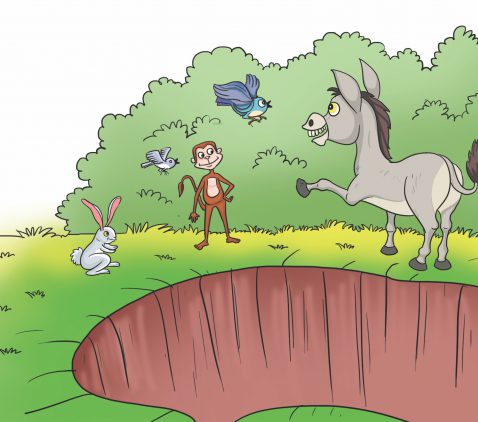
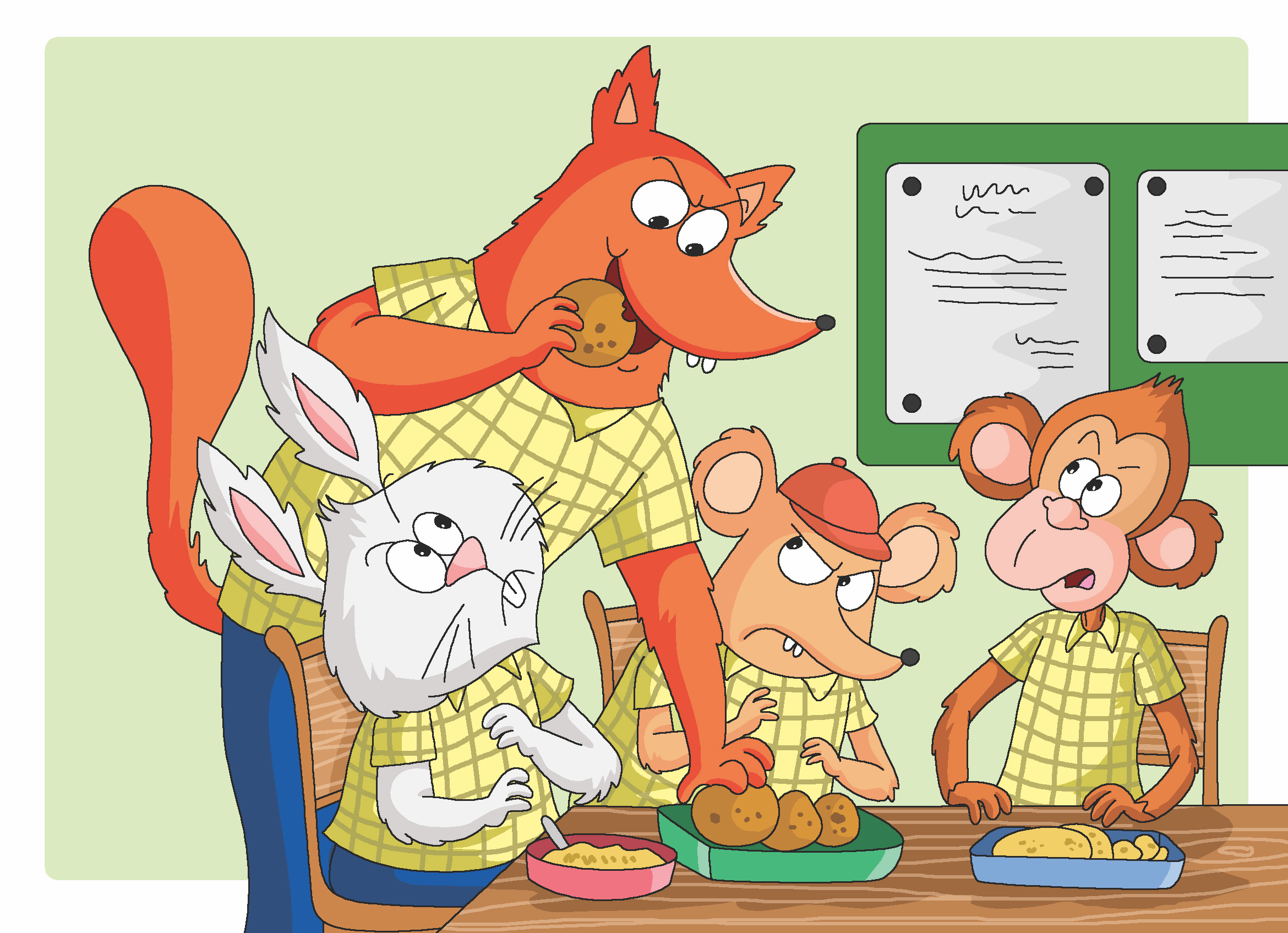
Cheeku rabbit, Meeku mouse and Jumpy monkey were having lunch in their classroom.
“Wow Meeku! The kachoris you bought for lunch are tasty!” said Cheeku, munching on the piece.
“My mother cooked these. She packed enough for all of us,’’ said Meeku, delighted.
Just then Baddy fox passed that way. “What’s that aroma?” sniffed Baddy. He glanced in the direction of the trio. They quickly tried to hide their lunch boxes. But it was too late.
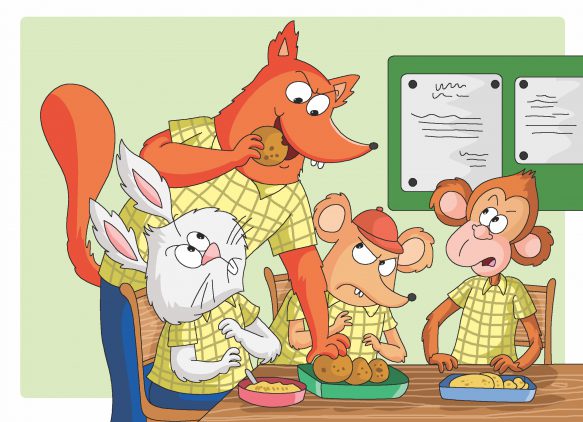
“Hey Meeku, don’t hide your lunch box. Kachoris are my favourite!” said the sly fox, quickly swooping into Meeku’s lunch box.
“Baddy! You cannot snatch someone’s lunch without asking first. It’s not good manners!” said Jumpy.
“Snatch?” mocked a shameless Baddy. “I would never use my strength against my dear friends.”
He dipped his paw into Meeku’s lunch box again for another helping of kachoris.
The three friends felt helpless and angry.
Baddy was a greedy fox. Often, he helped himself to the lunch of others. Yet, no one had the courage to utter a word to him.
Many of the students had complained about his behaviour to the school authorities. But he never tried to mend his ways. He was turning more troublesome by the day.
“Baddy’s behaviour is terrible. I find it rude!’’ said Cheeku.
“Yes, we have had enough of his bad behaviour,” said Jumpy, agreeing with Cheeku.“But, what can we do?”
“Let’s teach him a lesson,” said Jumpy.
He quickly gathered his friends around and whispered a plan.
The next day, they sat in class with their lunch boxes spread out in front. They waited for Baddy to walk into the trap.
As soon as they spotted Baddy approaching, Cheeku began munching a paratha. “Jumpy, this paratha is very tasty!” said Cheeku, between mouthfuls.
“Yes, this is the most delicious paratha I have tasted by far!” said Meeku as he licked his lips.
Hearing this, Baddy’s mouth started to water. He grabbed a paratha from Jumpy’s lunchbox. “Let me taste these delicious parathas too!” he said.
He gobbled up the first paratha and then reached for the second. That’s when things went crazy.
“Oh! It’s spicy! My tongue is on fire! Give me some water! Please!” begged Baddy. He had tears in his eyes.

“Here, Baddy,’’ replied Meeku, handing him a water bottle.
Baddy gulped the water. Little did he know that it was laced with chilli powder.
Now Baddy was huffing and puffing.
“What did you offer me?” said Baddy, panting heavily. “Someone please give me some water. My mouth is on fire!’’
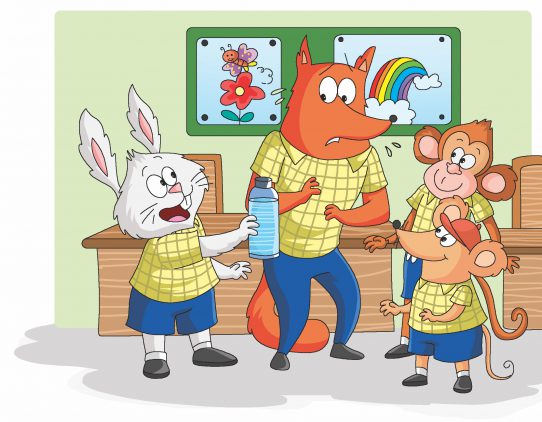
“No, Baddy!” replied Cheeku, “You snatch our food without the least concern. Now, enjoy the fruits of your actions.’’
The rest of the class gathered around Cheeku and nodded in agreement.
“I am sorry! I promise to never take anyone’s lunch again!” cried Baddy.
Cheeku gave Baddy a box of sweets and a glass of chilled water. “You must stop snatching food from others, Baddy,” said Cheeku.
Baddy felt relieved after drinking the water and eating the sweets. He then apologised to his classmates.
He vowed never to take what did not belong to him.
From that day on, the three friends never had to worry about Baddy stealing their lunch again.
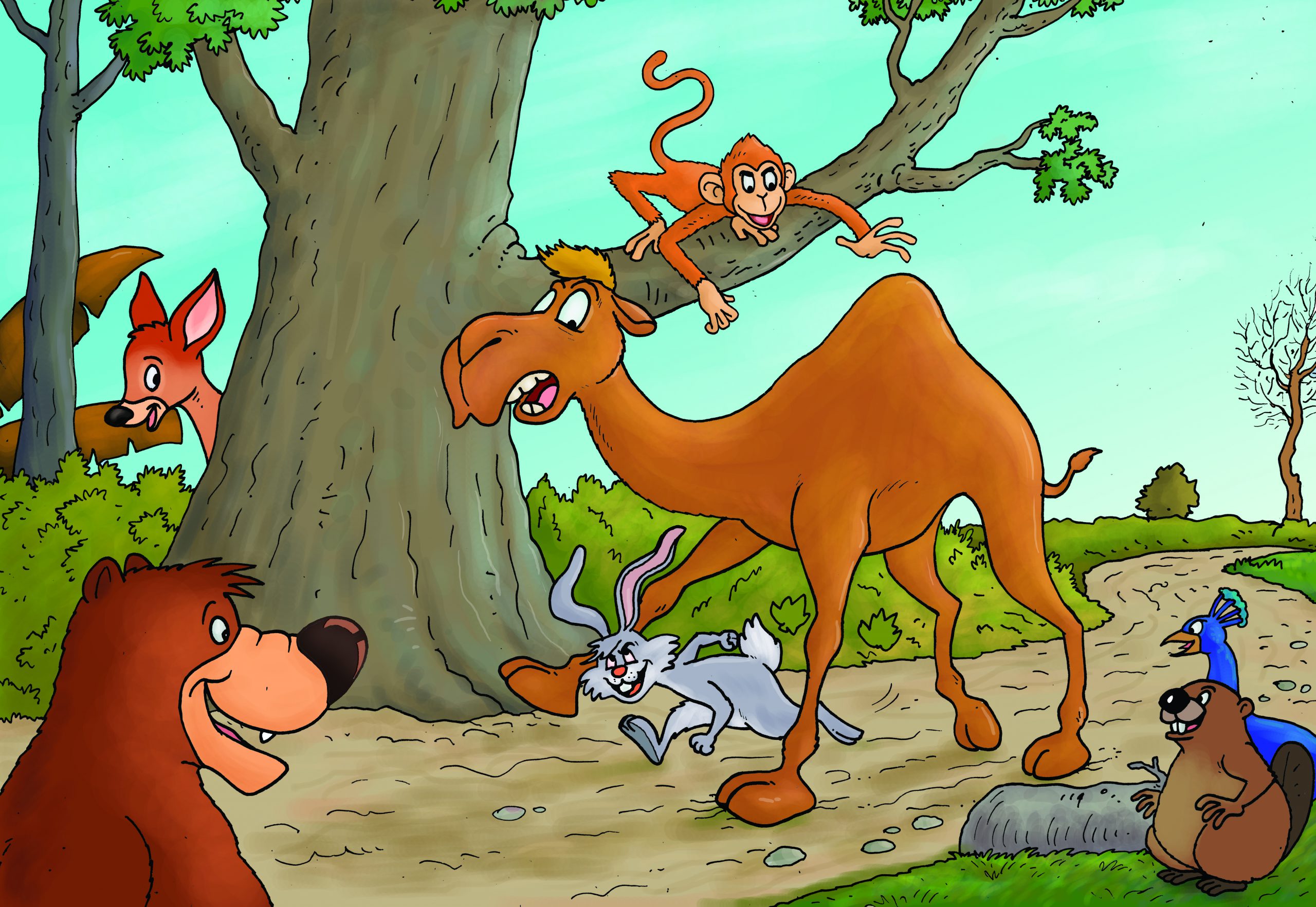
There was once a huge camel named Titu. One day, he wandered into a thick, green forest.
Now, the animals in the forest had never seen such a tall animal and he thus appeared strange to them.
Pintu monkey was the first to talk to him. He climbed up a tree so that he could see Titu better. “Who are you, and where are you from?” asked Pintu.
“My name is Titu and I live in the desert. I was passing through,” said Titu.
“There’s no space in this jungle for more animals. Go away!” said a scared Dhinki deer, hiding behind a tree.
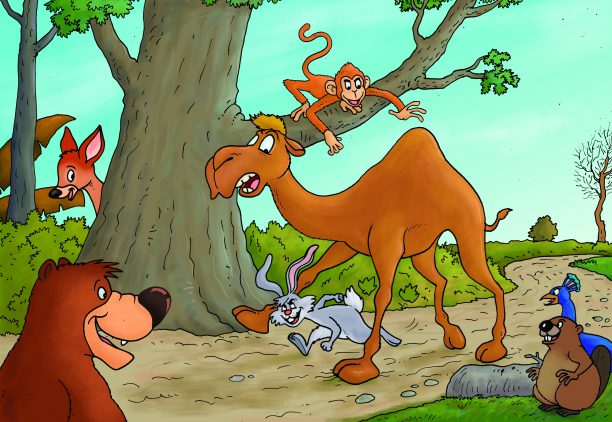
“I do not wish to make this my home. I will stay here for a short period,” said Titu. “So, let’s be friends!”
However, no one befriended Titu. Instead, they made fun of him. Bernie beaver laughed at his height, saying that Titu was as tall as a tent!
Titu, however, did not respond to the taunts.
Soon, the animals realised that Titu, despite being huge, did no harm. They took advantage of his gentle nature and harassed him.
Cheeku rabbit ran swiftly between Titu’s long legs to trip him over. Poor Titu jumped in fright! He was scared of crushing the little rabbit beneath his legs. Cheeku, on the other hand, proud of his prank, clapped his hands in glee.
Pintu pulled the next prank. He jumped from a treetop onto Titu’ back.
Thump!
He then rattled Titu’s hump and ran away quickly.
Golu bear was next. He dangled from Titu’s long neck and laughed heartily when Titu tried to shake him off.
By evening Titu was tired. His first day in the forest was bad. He decided to leave the forest early next morning.
That night, it rained heavily.
The river which was flowing through the jungle soon began to flood. At day break, most of the animals’ houses were underwater.
As the water level continued to rise, the animals got worried.
Perry parrot decided to fly out in search of safe ground. He returned with good news, “The ground on the other side of the riverbank is high. The floodwaters haven’t reached that part yet. We should move there.”
Scared, Dhinki deer cried, “But the water in the river is flowing fast. If we cross the river now, we could drown!”
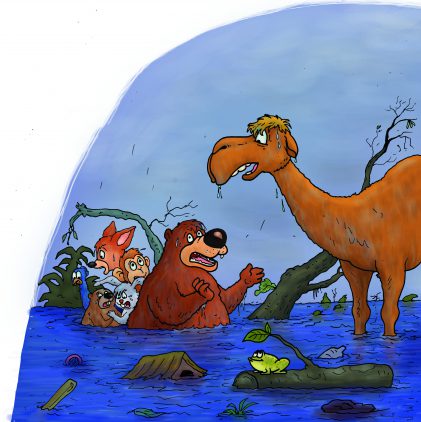
“Alas! We will drown if we stay here,” said Pintu monkey, in despair.
The water level was rising quickly. Soon, it seemed that the rest of the animals’ houses would get submerged too. The animals were helpless. Confused and scared, some began to cry.
“I will help you,” said Titu, standing in water, which hardly reached his knees.
“You will?” asked a surprised Golu.
The animals struggled to stand in waist-deep water as they clung to each other.
“Yes,” said Titu, nodding his head.
“But, we played pranks on you!” said Pintu monkey, surprised. He could not believe that the same Titu that they had troubled, wanted to help them.
“True, you behaved in a manner that made you feel good,” said Titu. “I will do what I feel is right.” He smiled, “I have always considered you all friends. And a friend in need is a friend indeed!”
The animals hung their heads in shame.
Titu spoke, “Let’s not waste time, my friends. The water level is rising! Climb onto my back and I will take you to the other side, in turns.”
“Will it be safe?” asked a trembling Cheeku rabbit.
“My legs are long. So, I can cross the river easily. Hold on to my hump, and do not let go. For if you do, you will fall into the river and drown,” warned Titu.
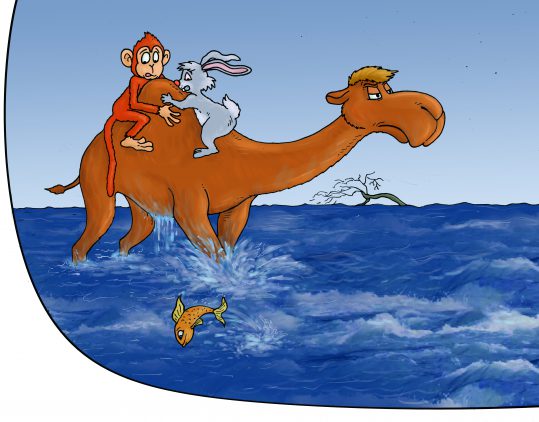
It was decided. The small animals crossed the river first, followed by the big animals.
In a span of two hours, Titu took all animals to safety. “Titu, you are good! Please forgive our rude actions,” said Golu bear with folded hands. All the animals joined him in pleading for forgiveness.
Titu replied, “You are a nice lot, just a little naughty. If you stop with your pranks, you will be a whole lot nicer.” With that he let out a loud laugh, and all the animals joined him.
“We will all stay here till the water level comes down. Then we will arrange a feast for Titu!” said Golu. Everyone clapped.
While waiting for the flood to clear, the animals kept themselves busy. Some started collecting food, while others like Pintu monkey, entertained everyone with his funny tricks. Koyal cuckoo sang a song, while Shyamu Peacock danced. There was an air of fun and frolic around.
Two days later, the floods cleared and the animals returned to their homes.
Titu had made friends with all the animals who took great care of him.
Yet, Titu started missing his home.
One day, he gathered all his friends and said, “Dear friends, I would now like to return to the desert. It’s been a long time since I left my home. My parents must be worried.”
“Please stay,” pleaded Dhinki deer. However, the animals knew that Titu’s reason to leave was justified. They were silent. Bernie beaver, who had grown close to Titu said, “If you can’t stay, I will accompany you back to your home.”
“So will I,” added Pintu monkey.
“I would love to take you all to my home in the desert, but you will not survive the desert heat,” said Titu. He explained, “This jungle is full of lush, green trees and flowing rivers. The desert is the exact opposite. It is extremely hot, with no signs of trees or water, for miles!”
This surprised the animals. Golu asked, “If there is no water, how do you quench your thirst?”
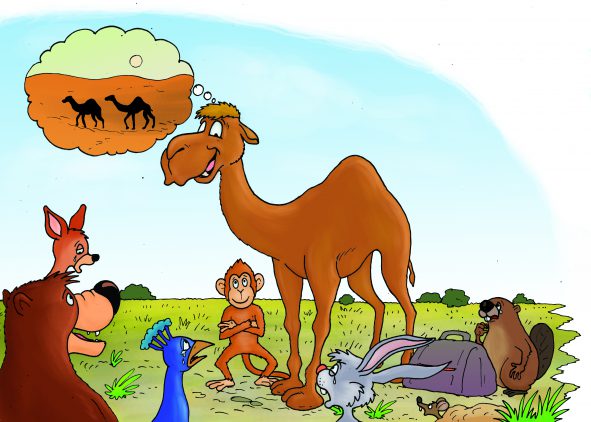
“We camels have a sac inside our neck. We fill that sac whenever we find water. We then quench our thirst with droplets of water from that sac. Hence, we can stay for nearly a week without water. But that is not possible in your case friends,” said Titu.
The animals realised that they could not accompany Titu to the desert, nor ask him to stay back. Everyone was sad.
Golu finally said, “Go if you must, but promise that you will visit us all at least once, every year.”
“I will, for sure,” said Titu, happily. He too was a little sad to leave his friends.
The whole jungle had a grand feast for Titu. The animals danced, sang and rejoiced.
The next morning, Titu started for his home in the desert.
All the animals thereafter awaited his return.
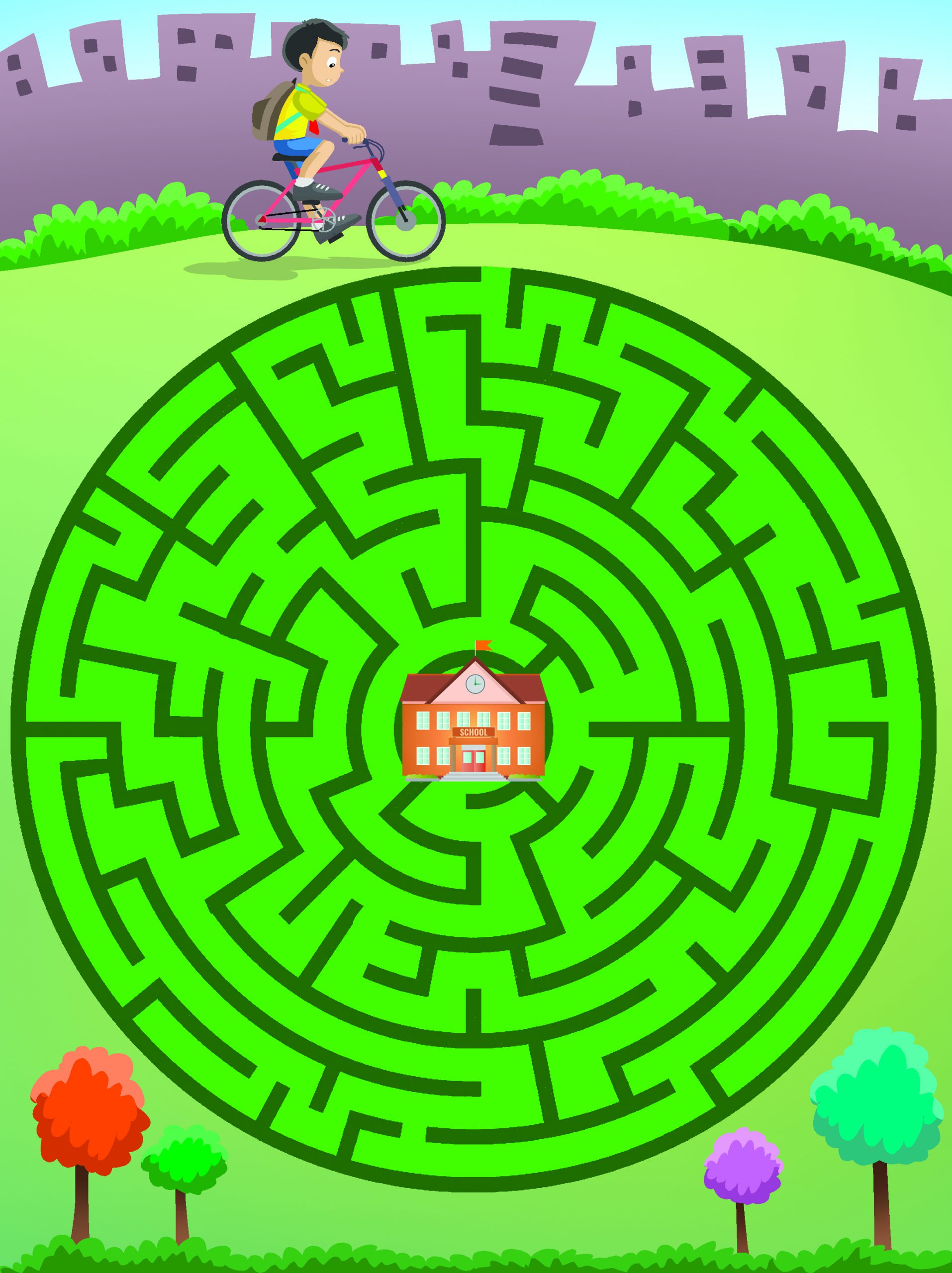
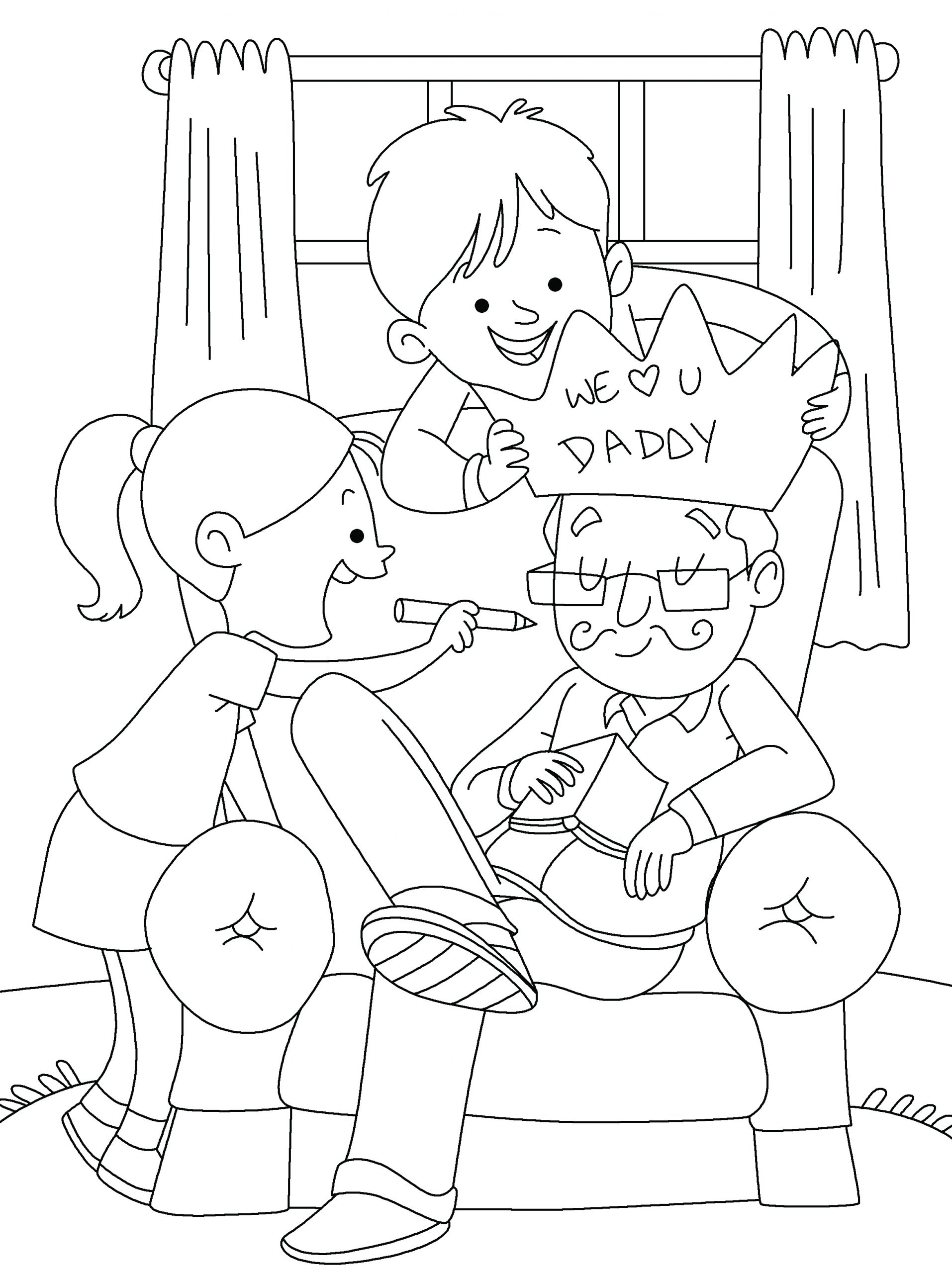
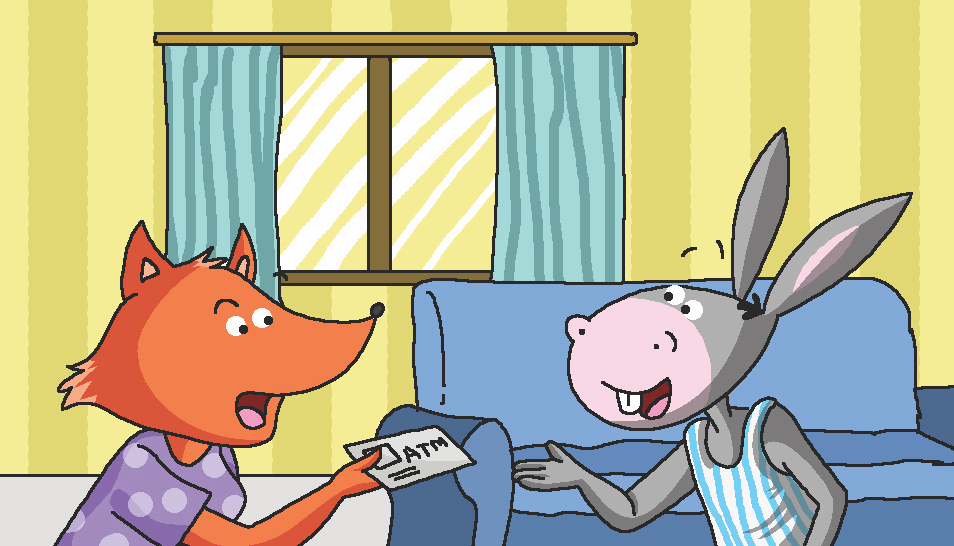
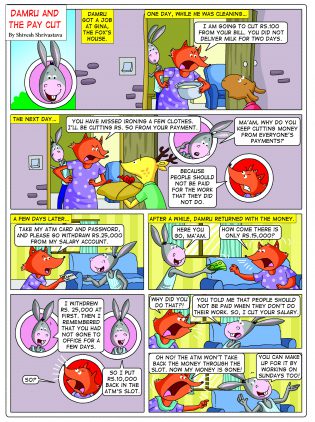
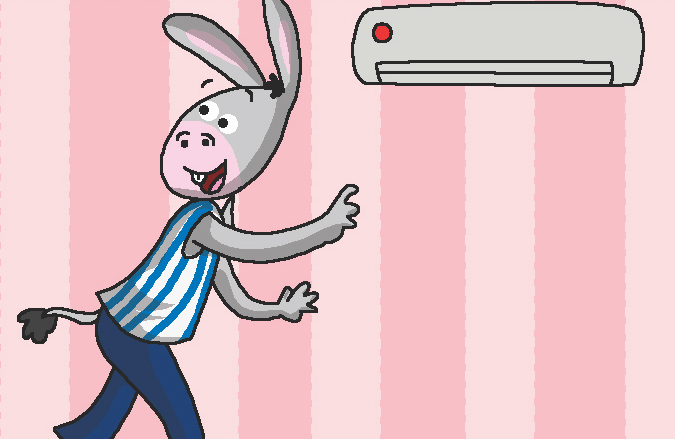
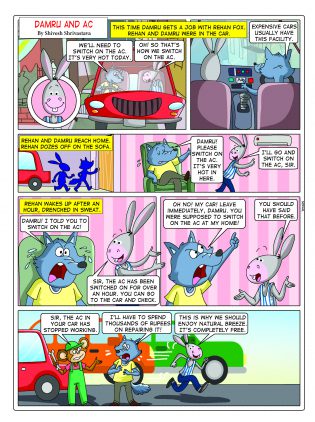

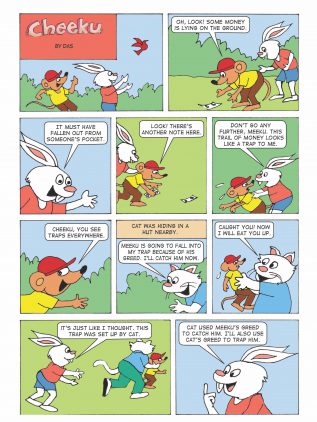
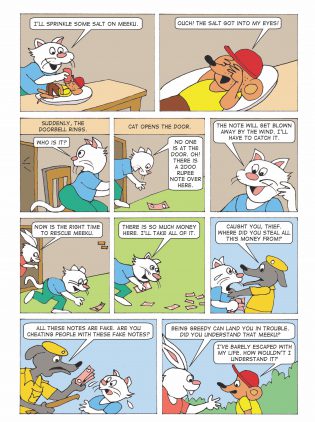
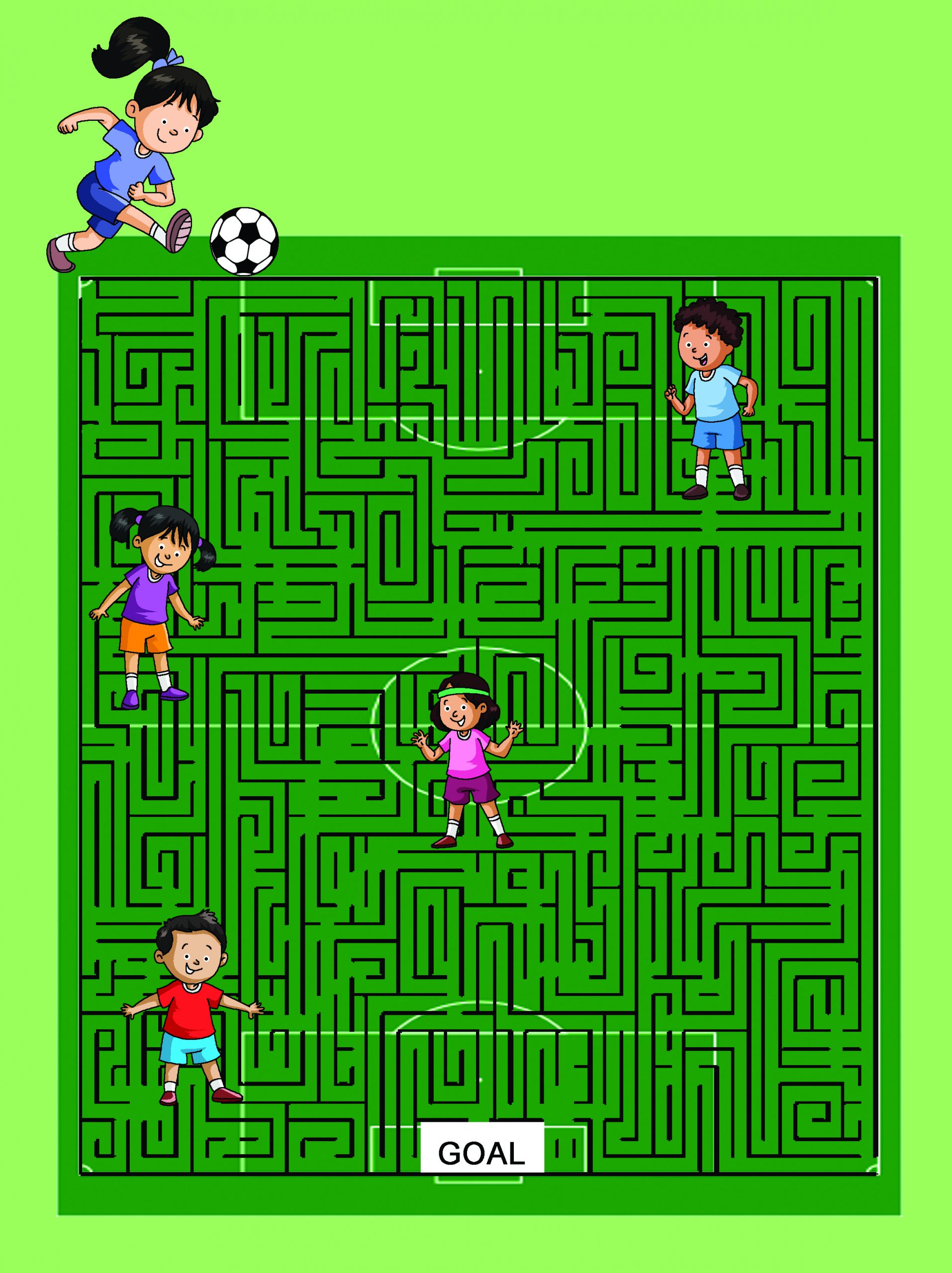

Sahil has come to a blood donation camp with his mother. Use the hints given below to find out which of the following people will be eligible to donate blood!
